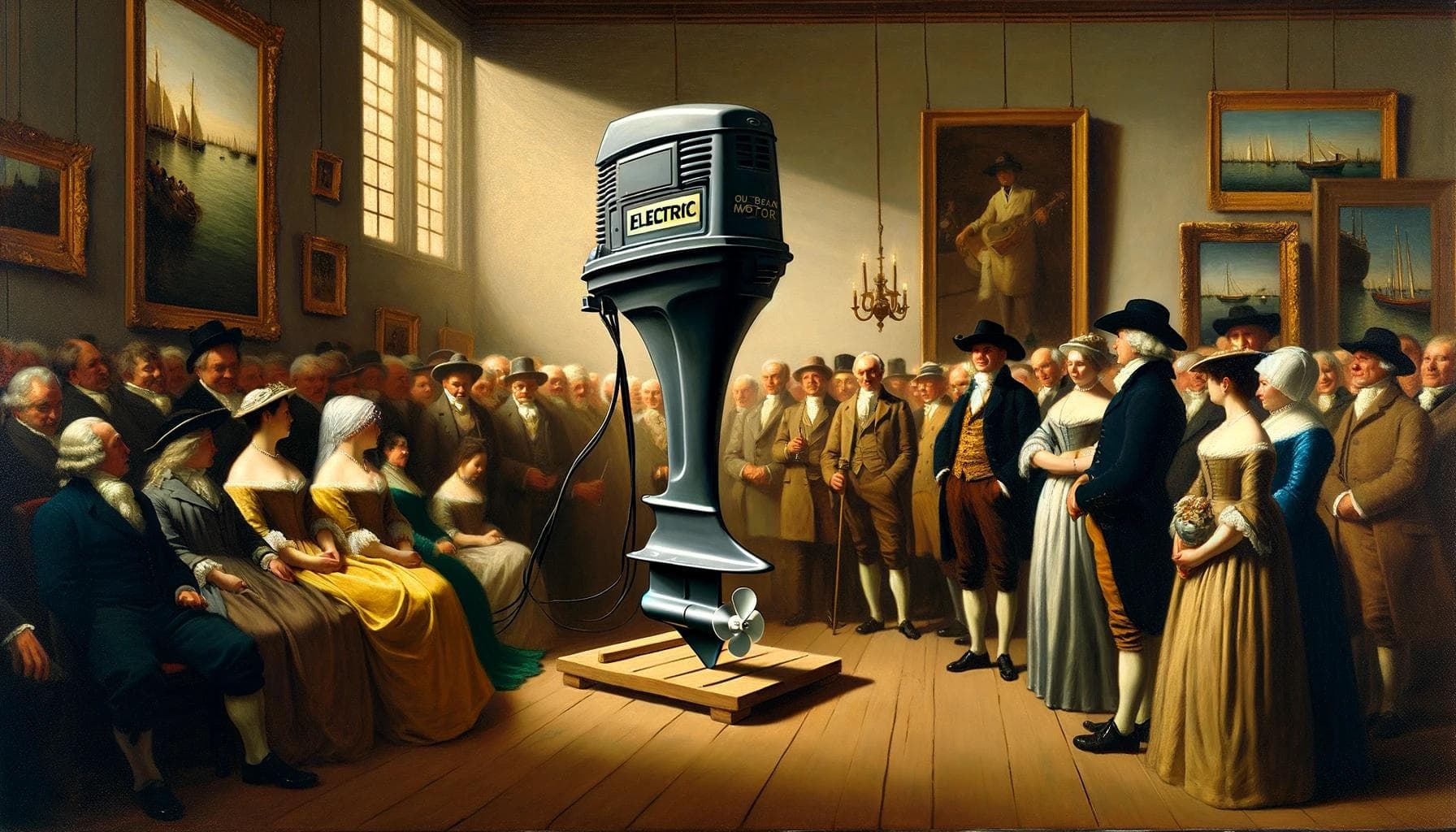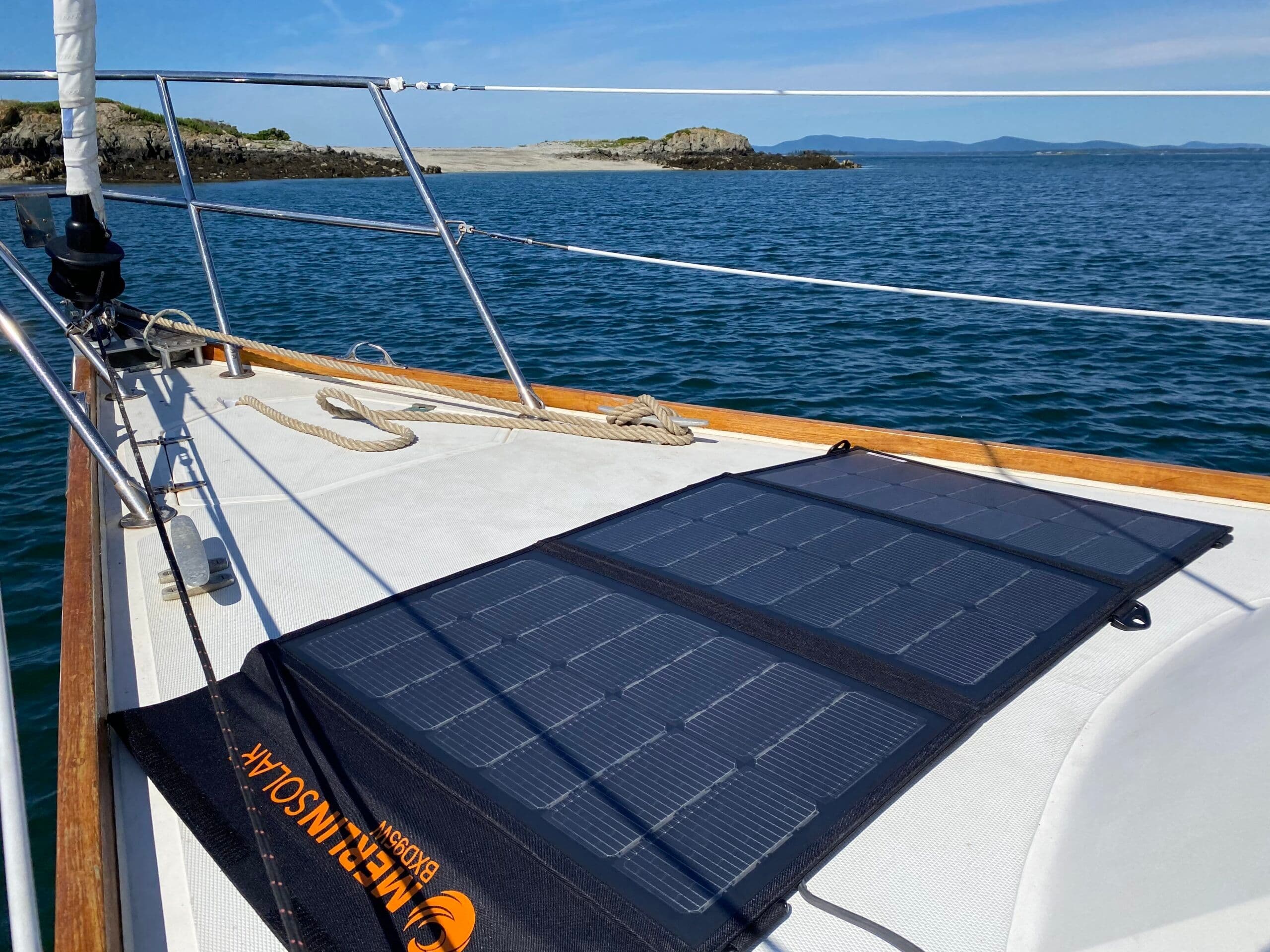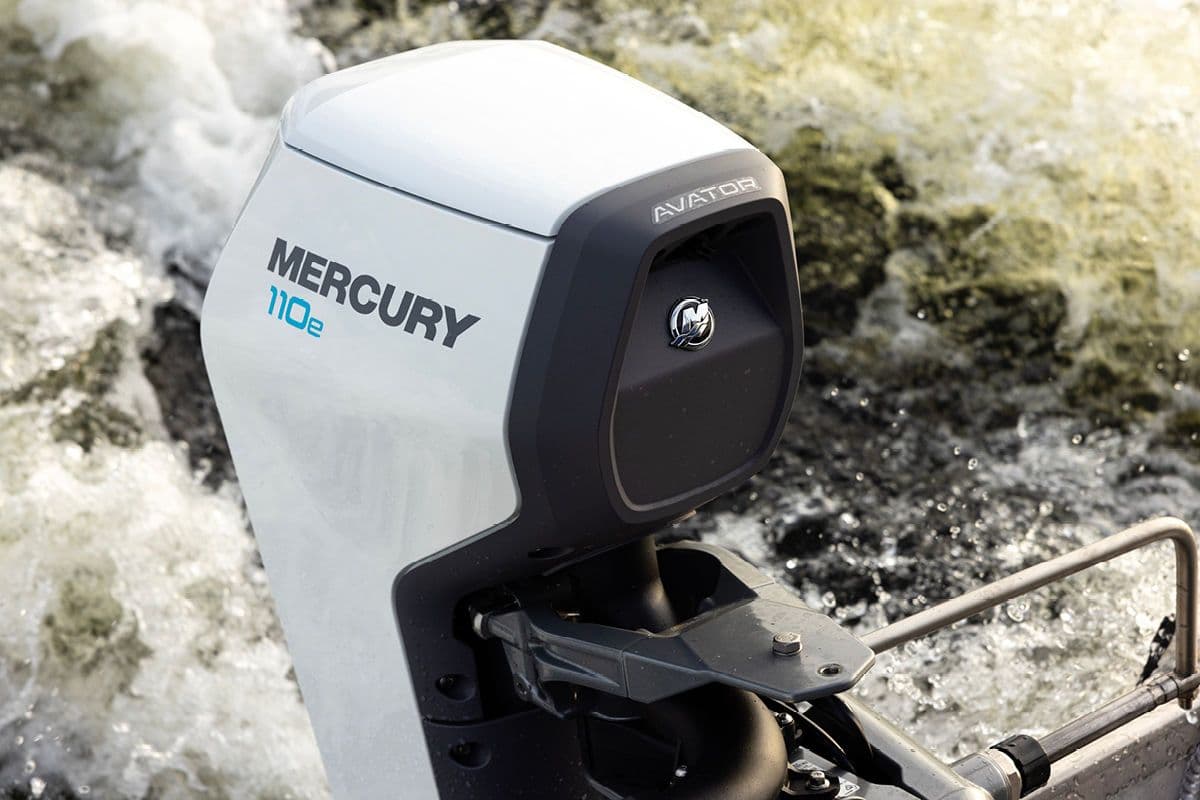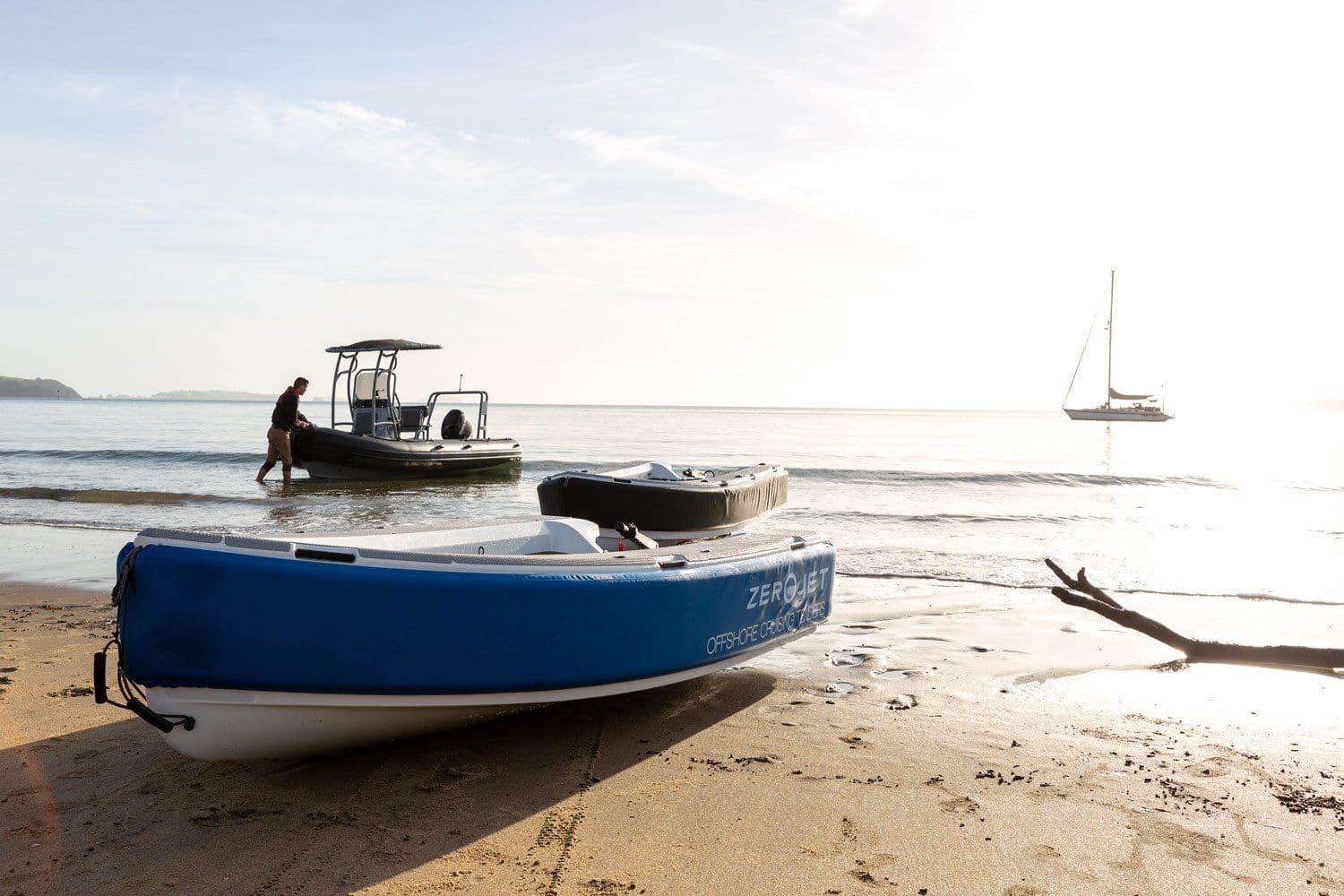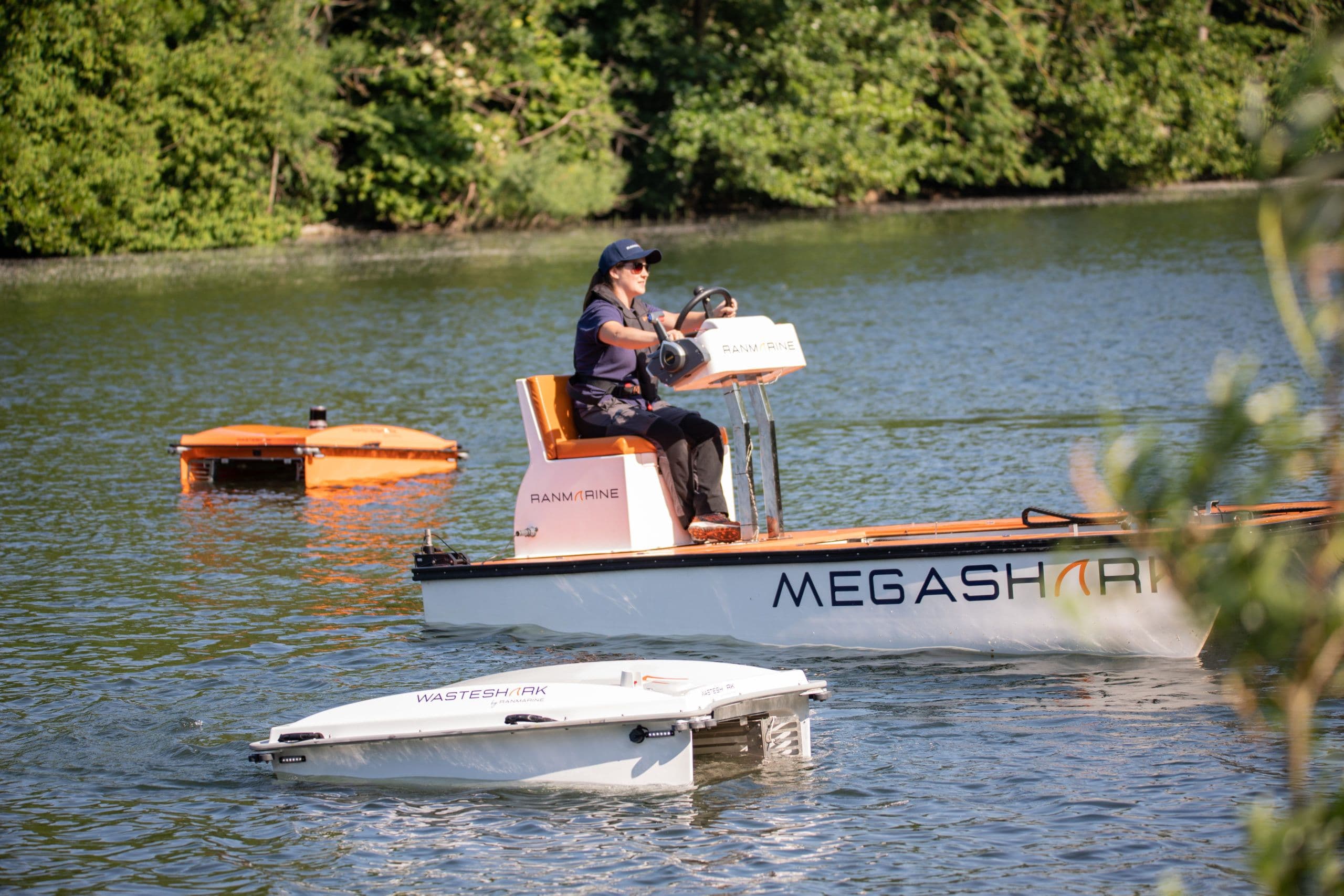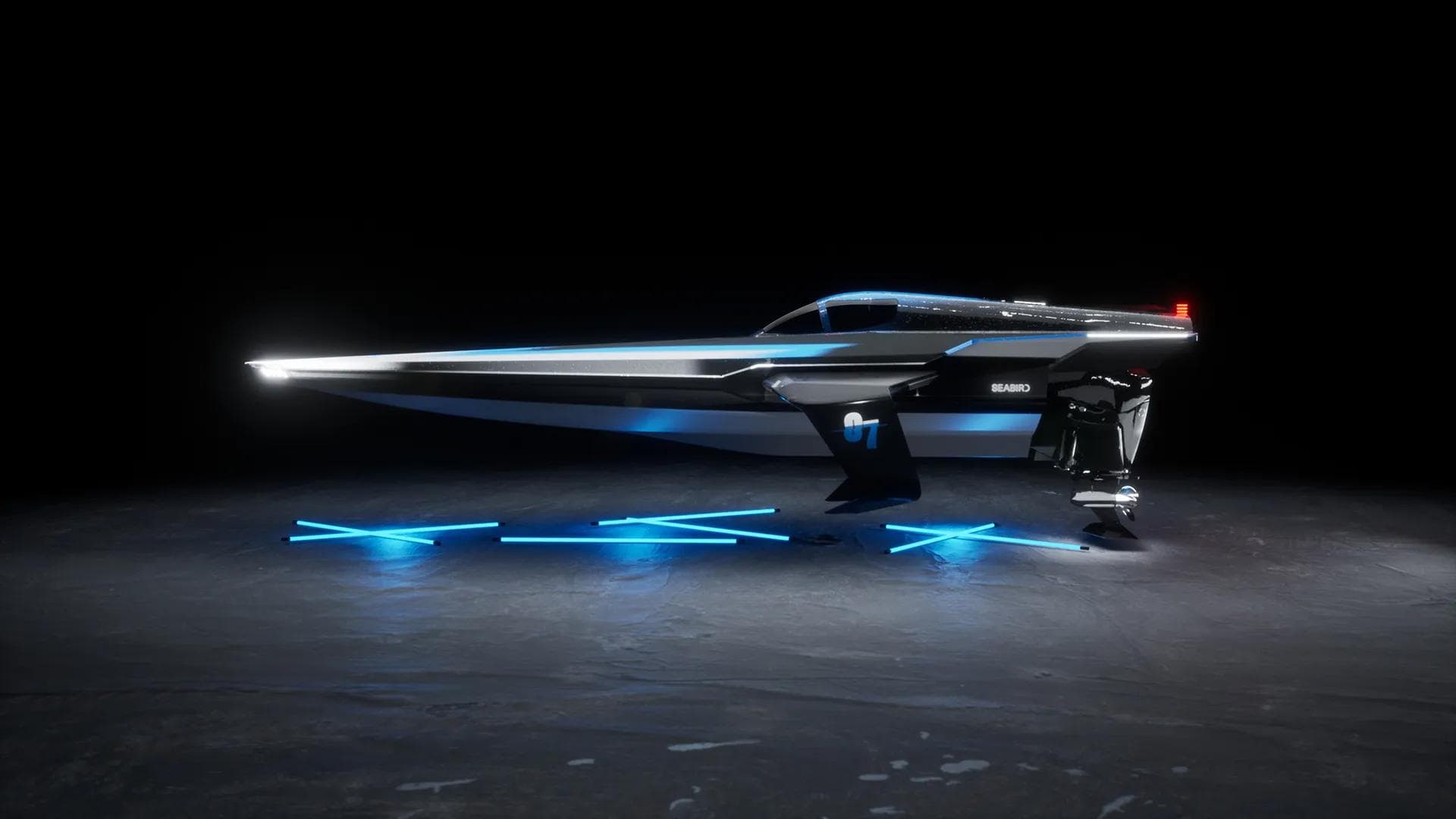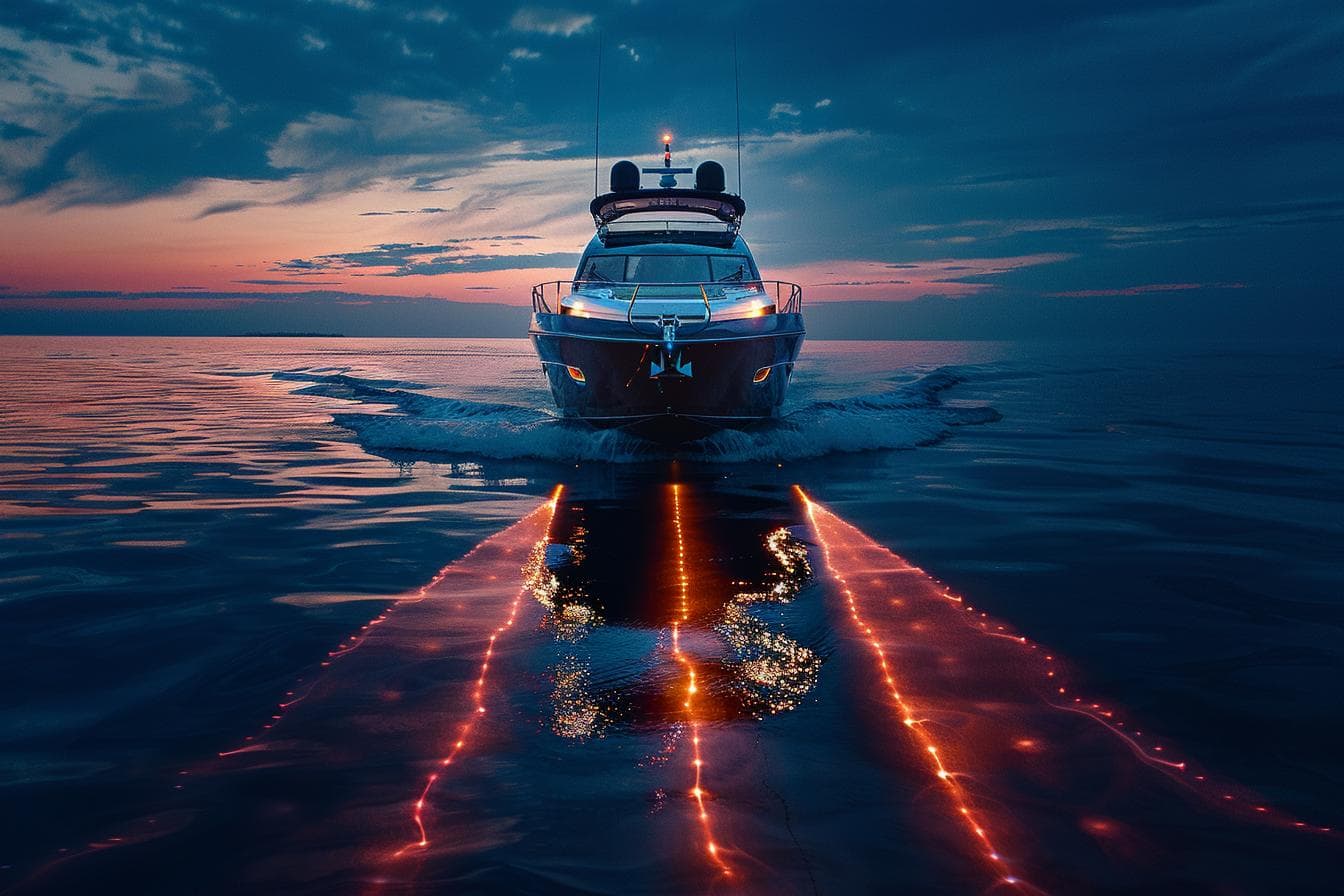Hello there, dear friend! If you're reading this, chances are you're interested in e-outboards and want to do some research. Well, I've done all the tedious work for you and put together a simple comparison that will keep you from drowning in boring tech-speak.
What this article definitely won't cover:
- No newbie guides: If you need a rundown on electric outboards, their watts and kilowatt-hours, or how they compare to their fuel-guzzling kin, head to this link. Then circle back here; I'll keep your spot warm.
- No tech overload: We won't bore you with countless numerical data, nor will we boast about one motor being superior because it has 50W of power more than the rest. Sure, we developed a formula to figure out which motors give you more for less, and it's tweaked our rankings a bit. But don't worry; I'll sprinkle these insights into our chat.
So what's worth haulin' in here?
- Unique features spotlight
- Comparative distinctions worth knowing
- The ultimate question answered: Which engine suits me best?
- If you're still pining for those numbers, our specs table and performance formula will satisfy your analytical cravings.
First things first: Every motor we discuss here excels in its unique way. We're not just ranking these from best to worst; we explore which suits your needs best. Trust us, there's something here for everyone.
And to spare us from sounding like a skipping record (and to keep your eyes from glazing over), let's only once talk about what binds these electric warriors together:
- Silence is Golden. They all operate under the radar. You'll be the first to know if any engine dares to break this rule.
- Guilt-free. No carbon footprint, no noise pollution, no water contamination.
- Speed is steady. Each motor keeps pace within a whisker of the others, making it all about preference, not top speed.
- Marathon runners. You'll get around 5+ hours of chill cruising on all or an hour if you push them to their limits.
Top Electric Outboard Motors
| Specification | Remigo One | EPropulsion Spirit 1.0 Evo | Torqeedo Travel (Essential) | TEMO-1000 | Mercury Avator 7.5e |
|---|---|---|---|---|---|
| Power (W) | 1000 | 1000 | 1100 | 1100 | 916 |
| Architecture | - | 48V | 33.6V | 47V | 48V |
| Motor Type | Brushless DC | Brushless DC | Brushless DC | Brushless DC | Brushless DC |
| Battery | Li-Ion, Integrated | Li-ion, Interchangable | Li-Ion, Interchangable | Li-Ioh, Interchangable | Li ion NMC, Interchangable |
| Battery Capacity (Wh) | 1085 | 1276 | 1080 | 740 | 1000 |
| Ability to connect third-party battery | No | Yes | No | No | No |
| Charge Time | 3 Hrs (Fast), 6 Hrs (Std.), 12 Hrs (DC-DC) | 8.5 Hrs (Std.), 3.5 Hrs (Fast) | 6 Hrs (Std) | 5 Hrs (Std), 12 Hrs (DC-DC) | 9 Hrs on 110W charger / 4 Hrs on 230W charger (sold separately) |
| Total Weight | 32lbs (14.5kg) | 44.1lbs (20.0kg) | 44.5lbs (20.2kg) | 33lbs (15kg) | 55lbs (35kg) |
| Control Type | Tiller | Tiller / Remote | Tiller / Remote | Tiller | Tiller / Remote |
| Shaft Length | 15-23" (38 - 59cm), Adjustable | 24.6" (62.4cm) / 29.5" (75cm), Not adjustable | 24.6" (62.4cm) / 29.5" (75cm), Not adjustable | 25.5" (65 cm), Adjustable up to 8" (20cm) | 15" (38.1 cm) / 20" (50.8 cm) / 25" (63.5 cm), Not adjustable |
| Propeller | 2-blade | 11" × 5.8" 2-blade composite | Propeller A 10x6,5 WDR | 2-blade | 7P 3-blade |
| Display | No | Yes, Backlit | Yes, Backlit, Colored | Yes | Yes, Backlit, Colored |
| Price (USD) | $2,350 | $2,800 | $2,998.00 | $3,085.00 | $3,500 |
All right, enough of the foreplay. First up at number 5:
#5 TEMO-1000
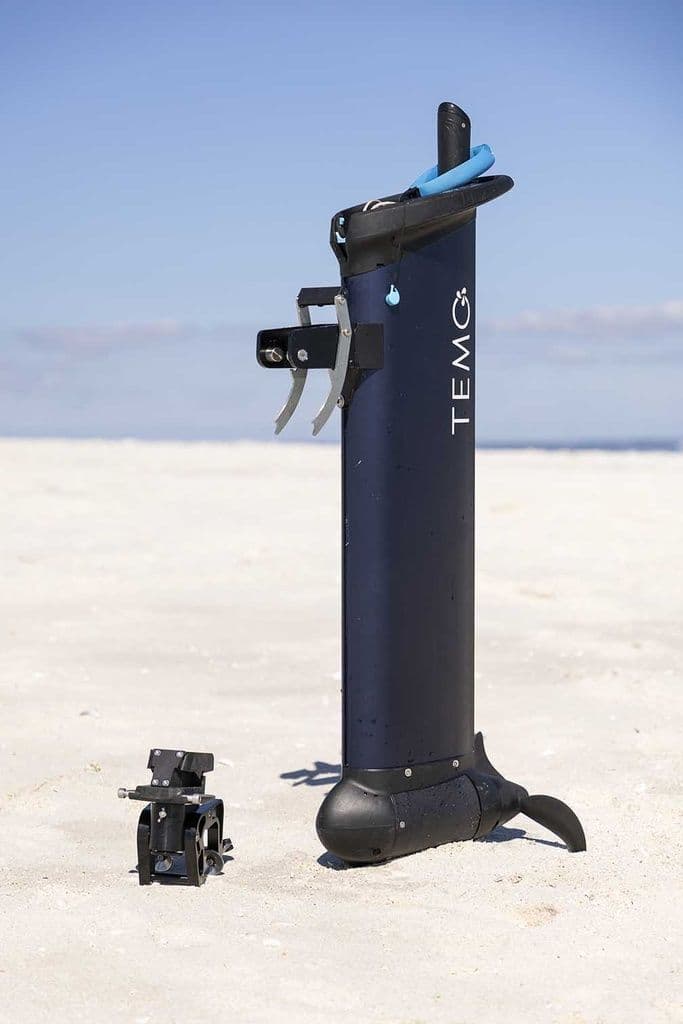
Designed and built with care in France, TEMO-1000 has tapped into the strengths of its competitors and secured a foothold on our list.
First, you notice its innovative shape, which is different from what you used to, huh?
Beyond aesthetics, this rudder-like design slightly boosts steering capabilities and makes handling flexible (though there's room for improvement, as you'll figure out later).
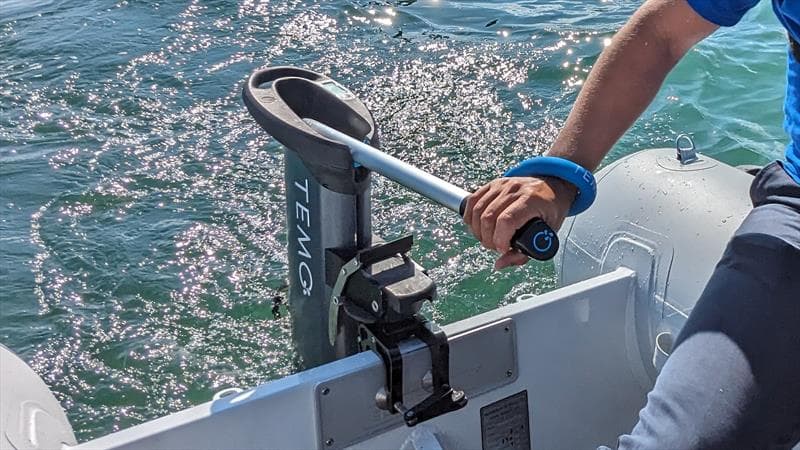
The design of the motor is neat:
- Fairly simplistic and intuitive
- Compact and portable body
- Minimalistic digital display
- Stylish tiller with a twist-throttle grip
Weighing a light 33 lbs (15kg), this fella is breezy to deal with. It attaches easily to a transom bracket, which has a 360-degree wheel that enables installation from inside your boat—a blessing in choppy waters! The tiller is retractable, so while hidden, it won't bother you during transportation.
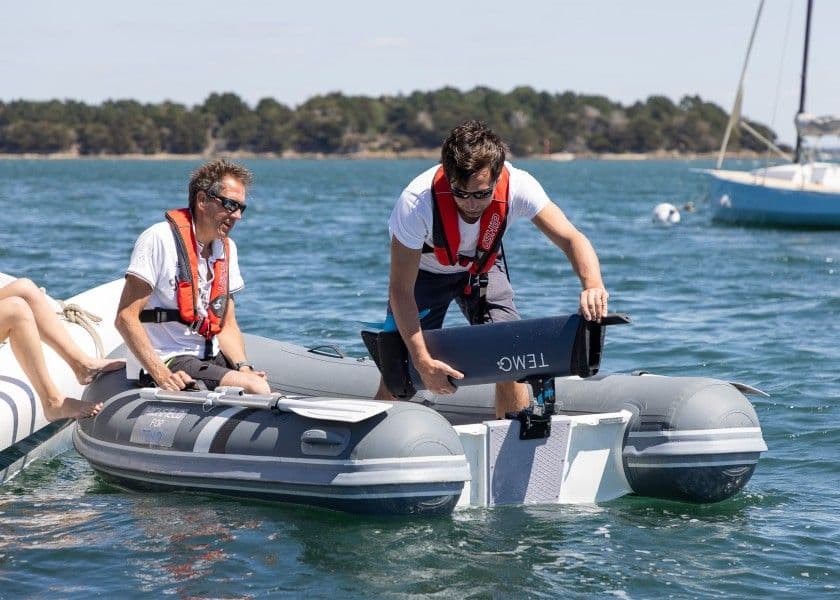
The handle's placement is the only thing I'm concerned about.
The single small handle on the top could be better positioned to carry it with optimal weight distribution. What if I'm a long-handed short guy? I am supposed to hold it horizontally in two hands, then. Shame there is no second handle on the other side for this occasion.
Honestly, I wouldn't be nitpicking if I didn't know it could be designed better (yes, Remigo, I'm talking about you).
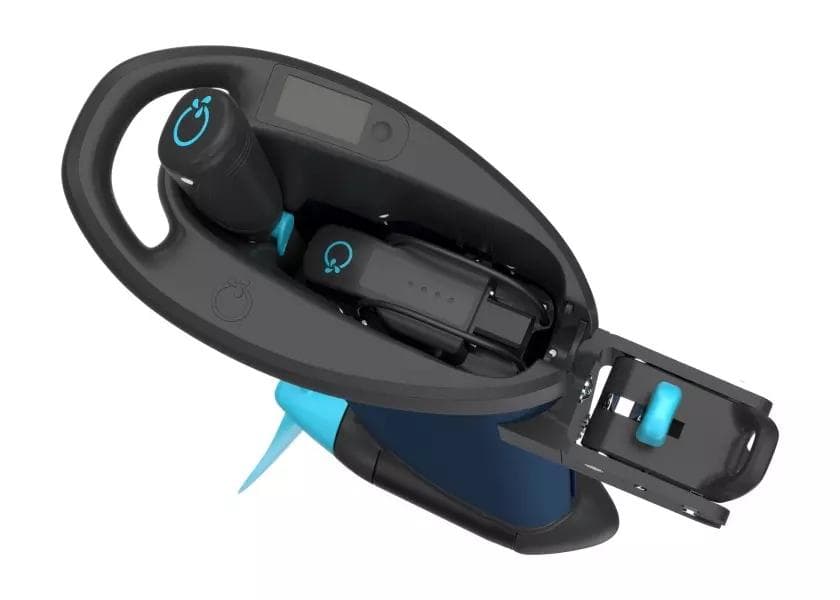
And what about power?
As you can see in our comparison table, it packs quite a punch, but it falls behind when weighed against the price/value ratio.
And it is an excellent time to talk about battery, which is a culprit of the statement above.
Its lower capacity, more than 30% below average, means less runtime than others. On the other hand, it weighs only 11lbs (5kg), and given that it's interchangeable, you might find yourself carrying a few in your pockets… Okay, maybe not in the pockets, but jokes aside, this is probably the most feasible in our top to carry a spare one. It also has an IP67 rating.
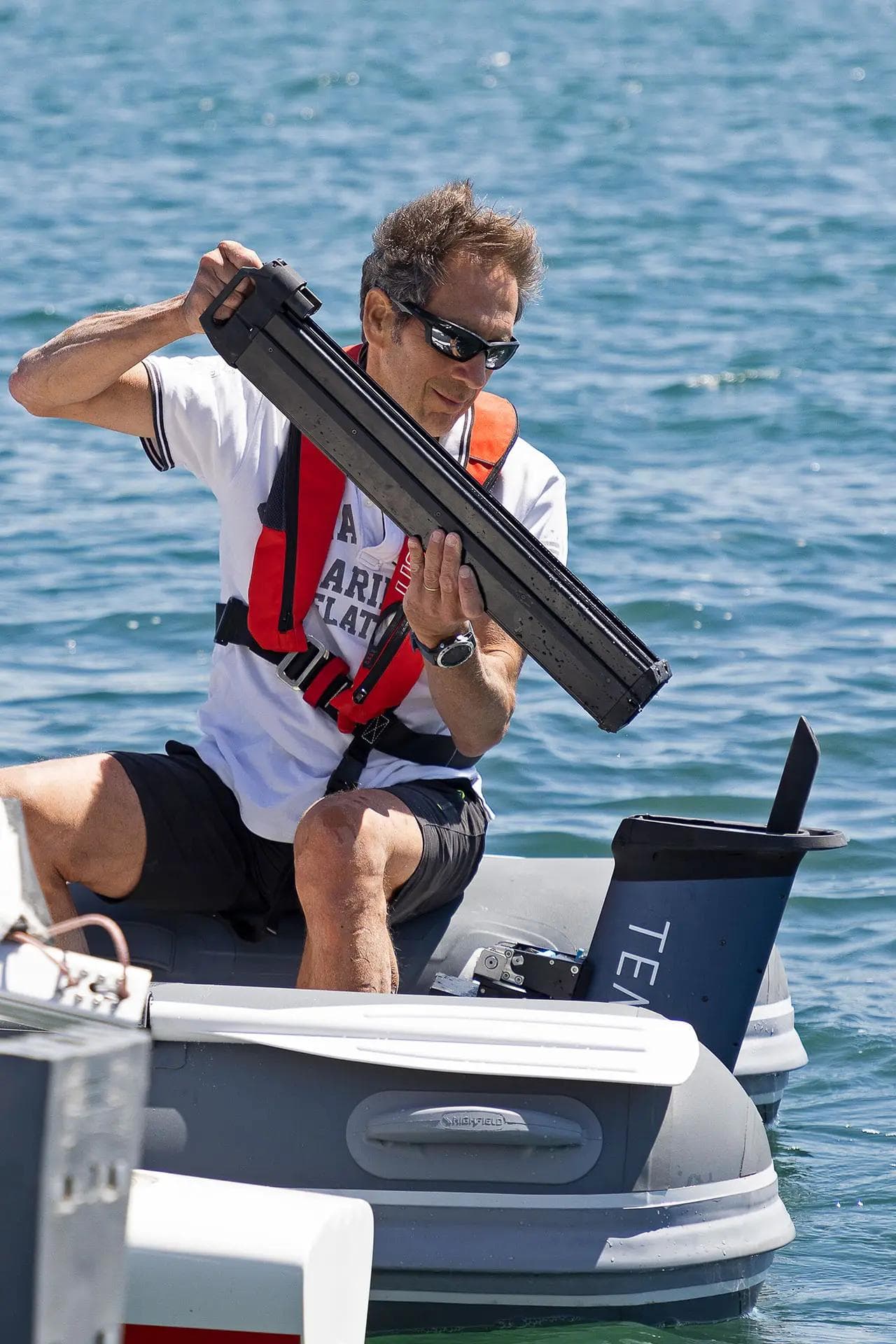
Now, talking versatility:
- Adjustable shaft height. Up to 8 inches (20cm) with this one!
- Got yachts or inflatable dinghies equipped with a rudder? TEMO-1000 fits in and could be fixed centrally.
- Prefer space on your aft area? It is stored parallel to the transom and out of the way.
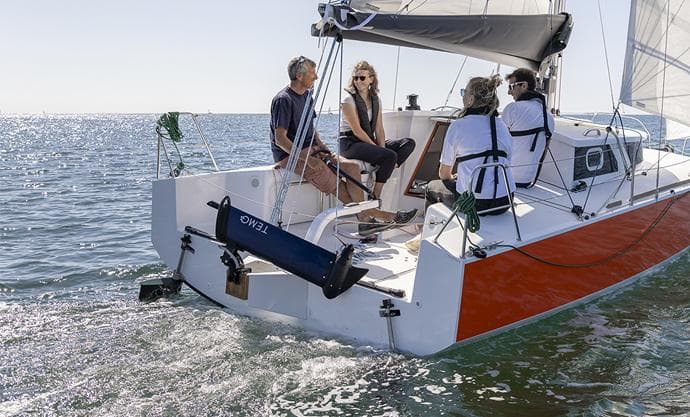
So, why does it deserve to be in the top 5? Does it deserve to be your motor of choice?
TEMO-1000 is like that handy friend with a solution for all your needs. Do you have a soft spot for cool-looking gear? Done deal. Want it to be portable? You got it. Need a spare battery? Sure thing. Need to use it on your smallest dinghy and your sailboat? He's got you covered.
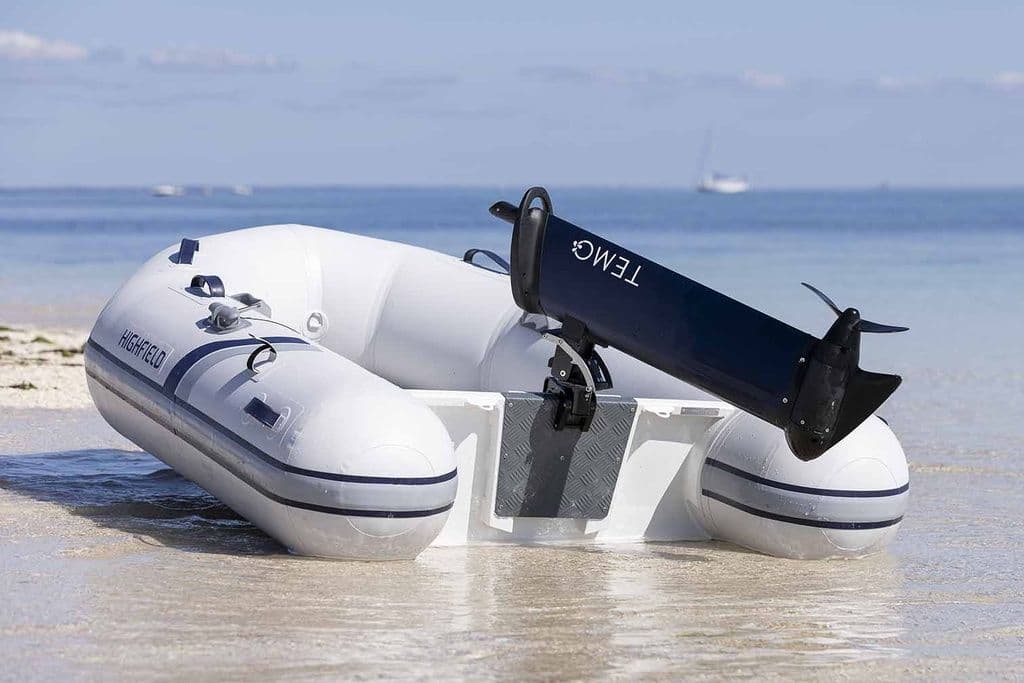
Yes, some motors can be even more portable or more good-looking. But if you're after an all-in-one solution, the TEMO-1000 could be your outboard engine soul-mate.
Did we just hint at good looks?
Well, Mercury, brace for impact!
#4 Mercury Avator 7.5e
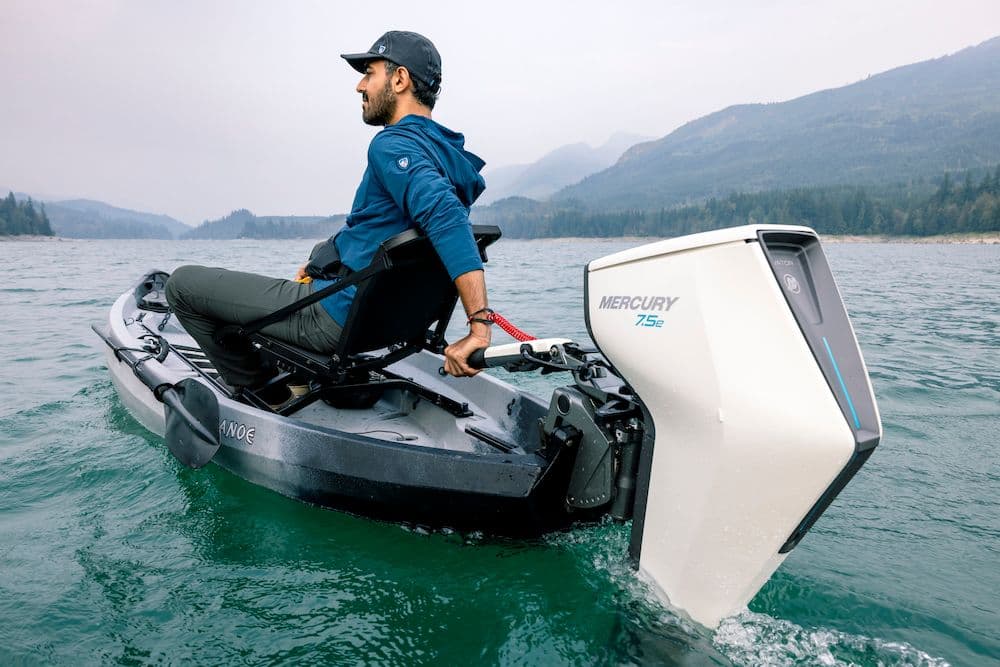
If outboards were supermodels, this would be on the Vogue cover.
The Cybertruck aesthetic gives me this aggressive "cutting through waves" vibe. I can't help but love it.
But beauty aside, this outboard had more than good looks. It's Mercury, and everything in it feels Mercury.
High-quality, durable, heavy.
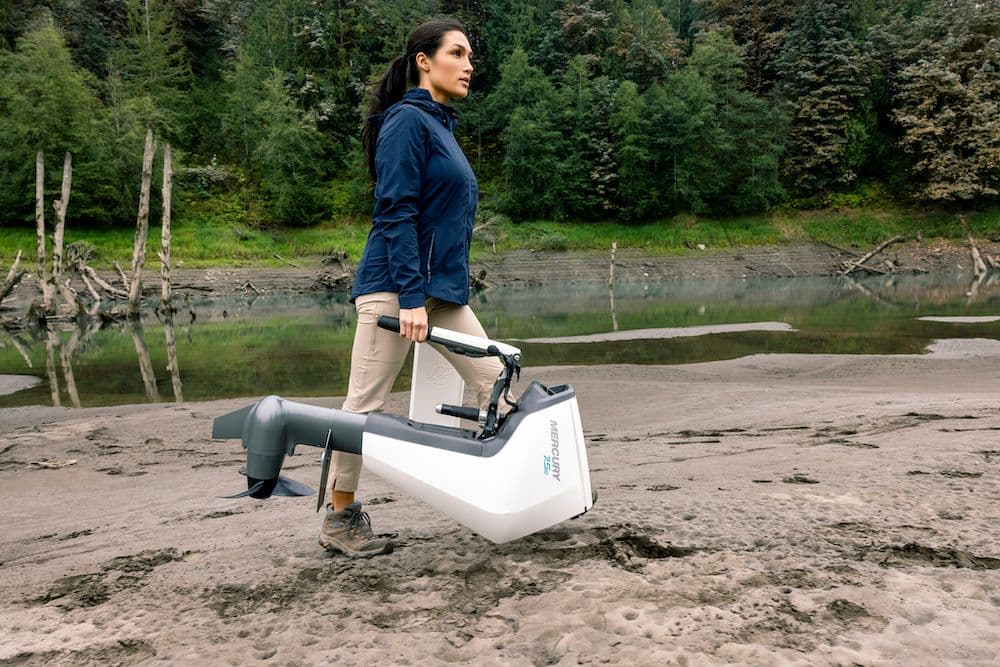
The inboard powertrain is packed with advanced tech:
- Boost mode. The system provides up to 20% more torque during hard accelerations.
- A transverse flux motor generates more torque with less effort, contributing to faster 0-3.5 knot acceleration.
However, despite its heftier price tag, it ultimately provides performance similar to our top five models.
The Avator 7.5e is a heavyweight on our list. It's big and weighs 55 lbs (25kg) fully assembled (excluding the transom bracket). Yet it has an interchangeable battery, meaning you can reduce the whole unit's weight while carrying it from the trunk to your fishing boat. Thankfully, the tiller folds down into a handy carry handle.
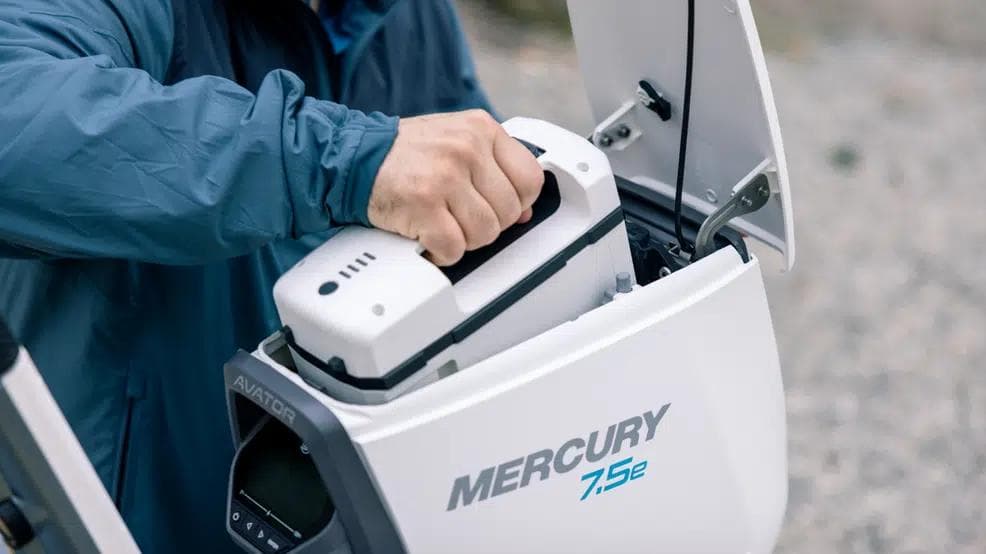
Speaking of batteries:
- It's interchangeable. You can have a spare, though I'd recommend hitting the gym first as it weights about 17 lbs (8kg)
- Average to our top 5 capacity
- Has no cables to connect. Just slides into place
- Fast-charge option. You can upgrade your standard charger to a somewhat "fast-charging" option from Mercury.
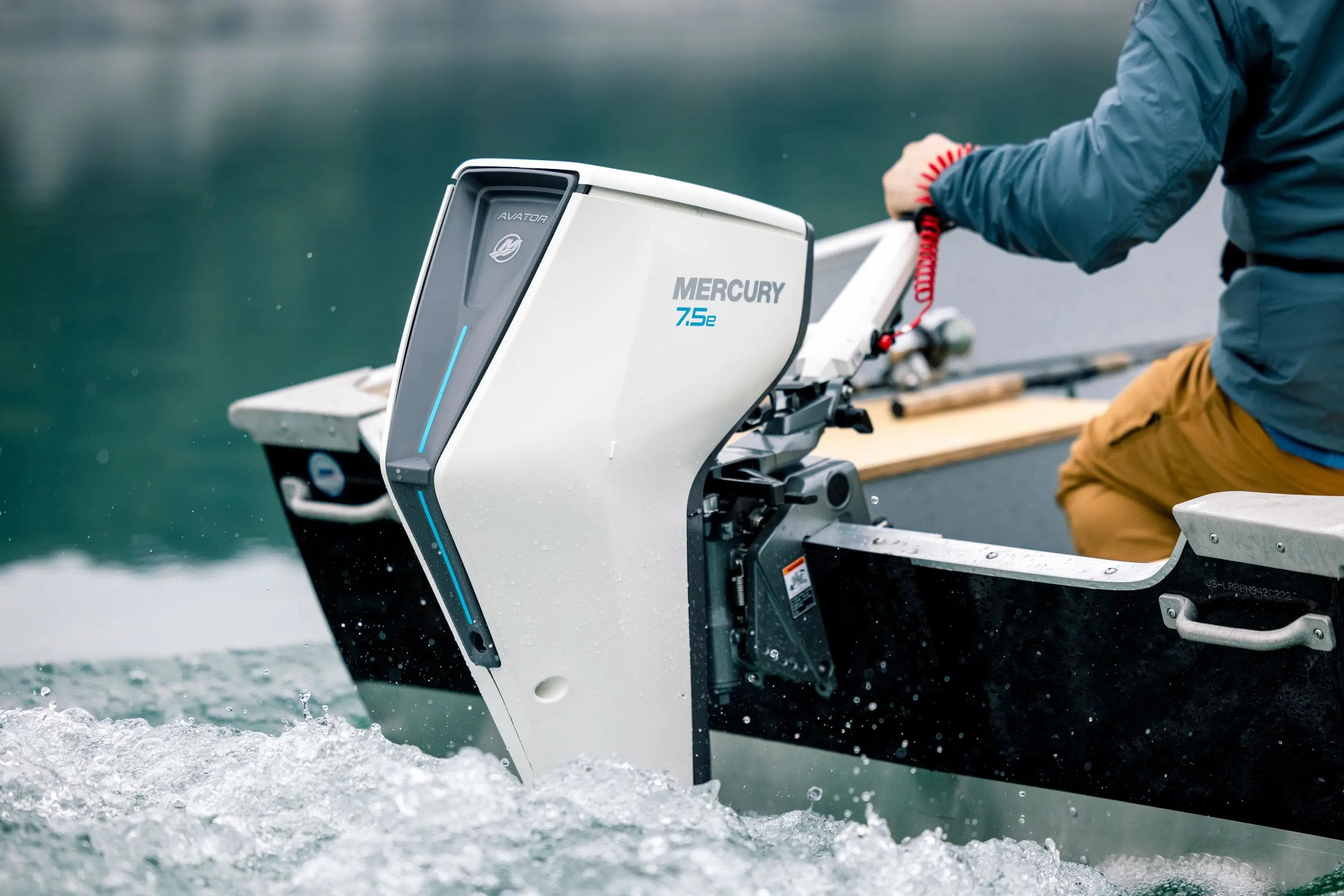
By the way, the Avator 7.5e electric outboard motor comes in two options:
- a tiller version
- with Digital Power & Shift remote controls
The tiller is highly adjustable: up, down, left, or right, so you can steer with either hand from any position.
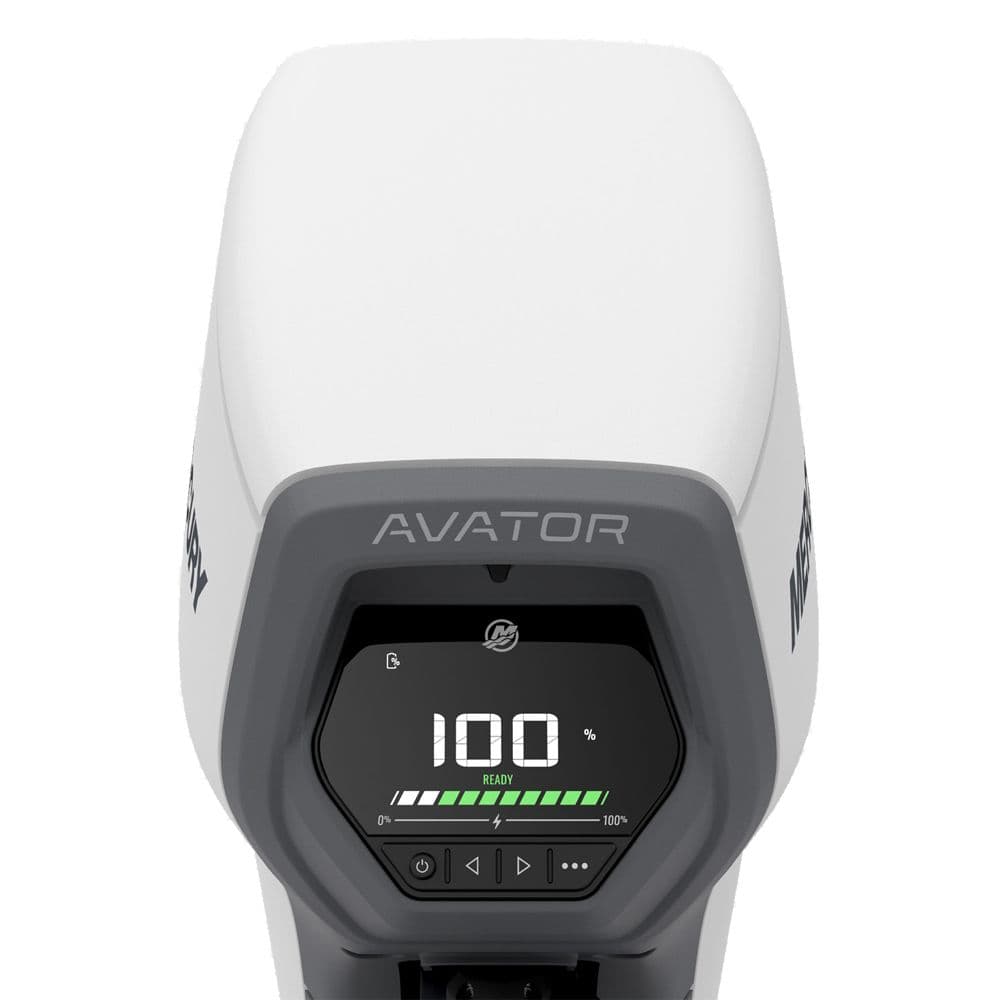
The display is just OP. It is full-color and vivid, so you can see it at night or under the bright sun. Besides providing basic information like battery level or energy consumption, it has an integrated GPS module that displays real-time speed and can even show depth beneath if connected to a depth finder.
Just remember, the shaft is not adjustable.
However, Mercury offered a range of available shaft lengths: 15", 20" and 25" (38cm, 50cm, 63cm)
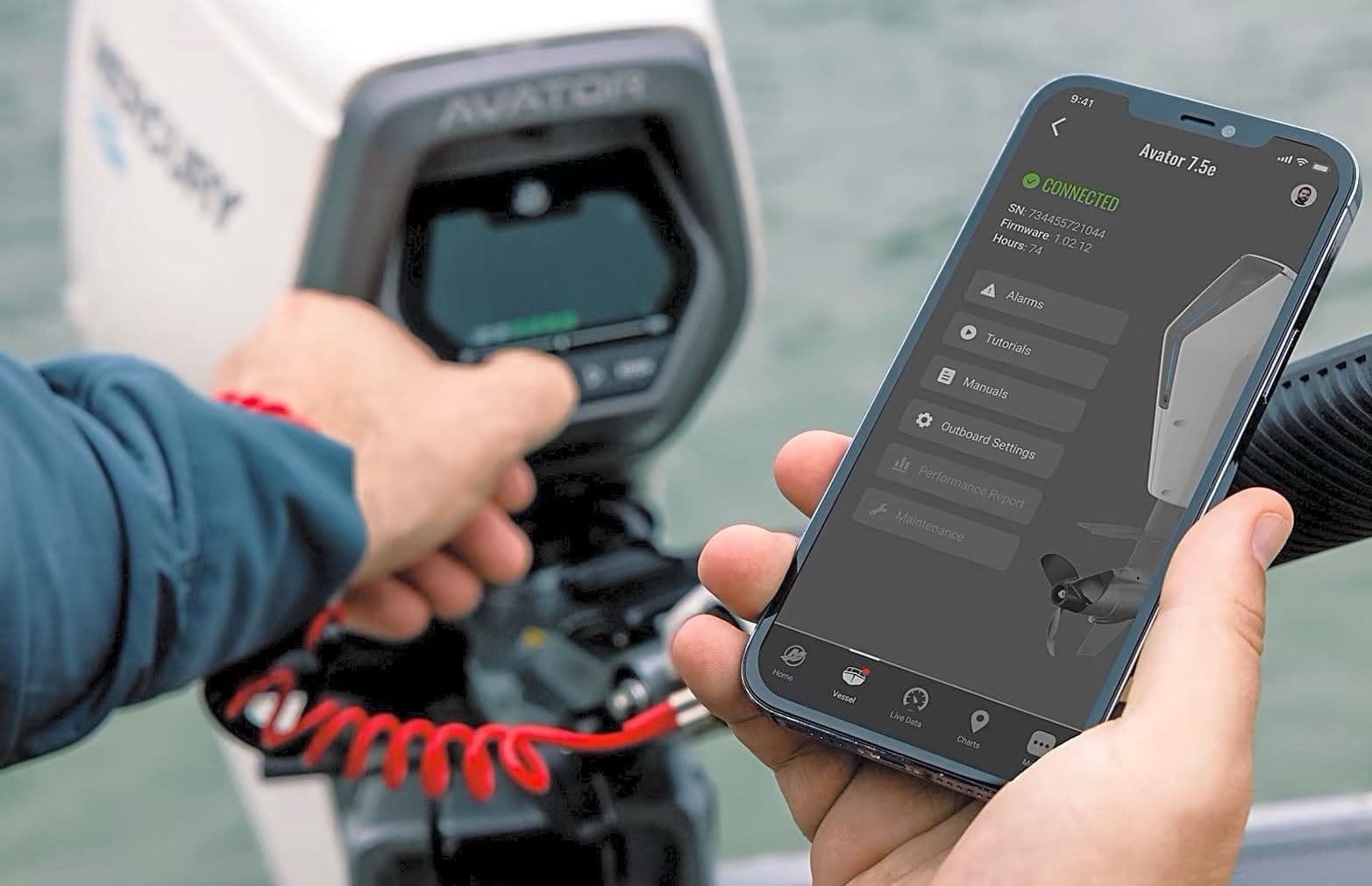
Price Factor.
Initially, I wanted to tackle Avator's high price tag, but soon enough, I realized that not everybody wants to buy a Toyota 4Runner (or Prado) over a G-Wagon. (Big Toyota fan here)
So, why does it deserve to be in the top 5? And Does it deserve to be your motor of choice?
Simply put, it delivers the most luxurious experience. And if you value quality and are willing to invest in superior experiences on the water, then the Avator 7.5e is your motor of choice.
Let's rev up for our third contender with champagne tastes on a beer budget.
#3 Remigo One
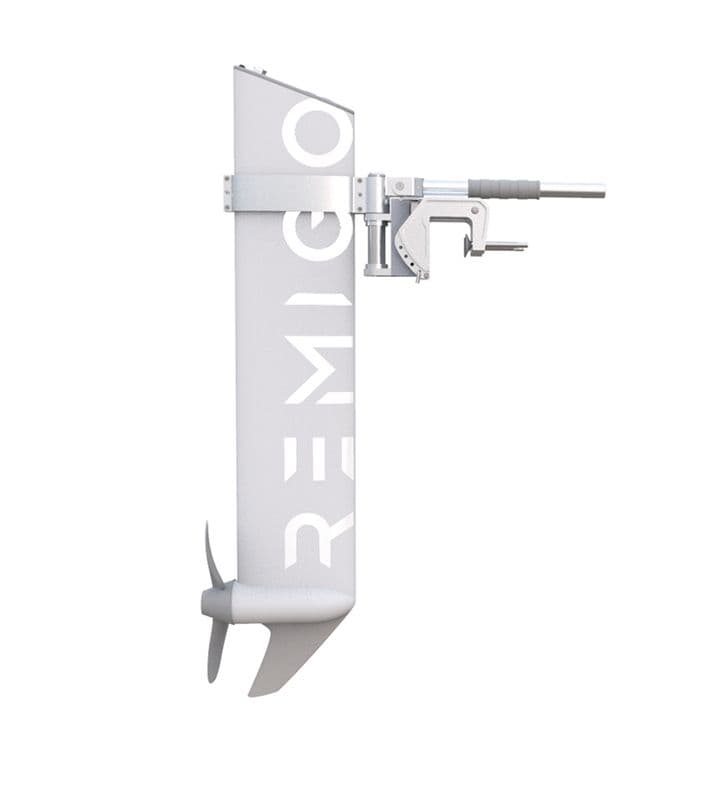
If I had to describe Remigo in one sentence, it would be like: "The world's first electric rudder."
Crafted by a dedicated team in Slovenia, this electric outboard engine is simple, affordable, and eye-catching.
Although it may lack high-tech features, its price makes it a solid third choice.
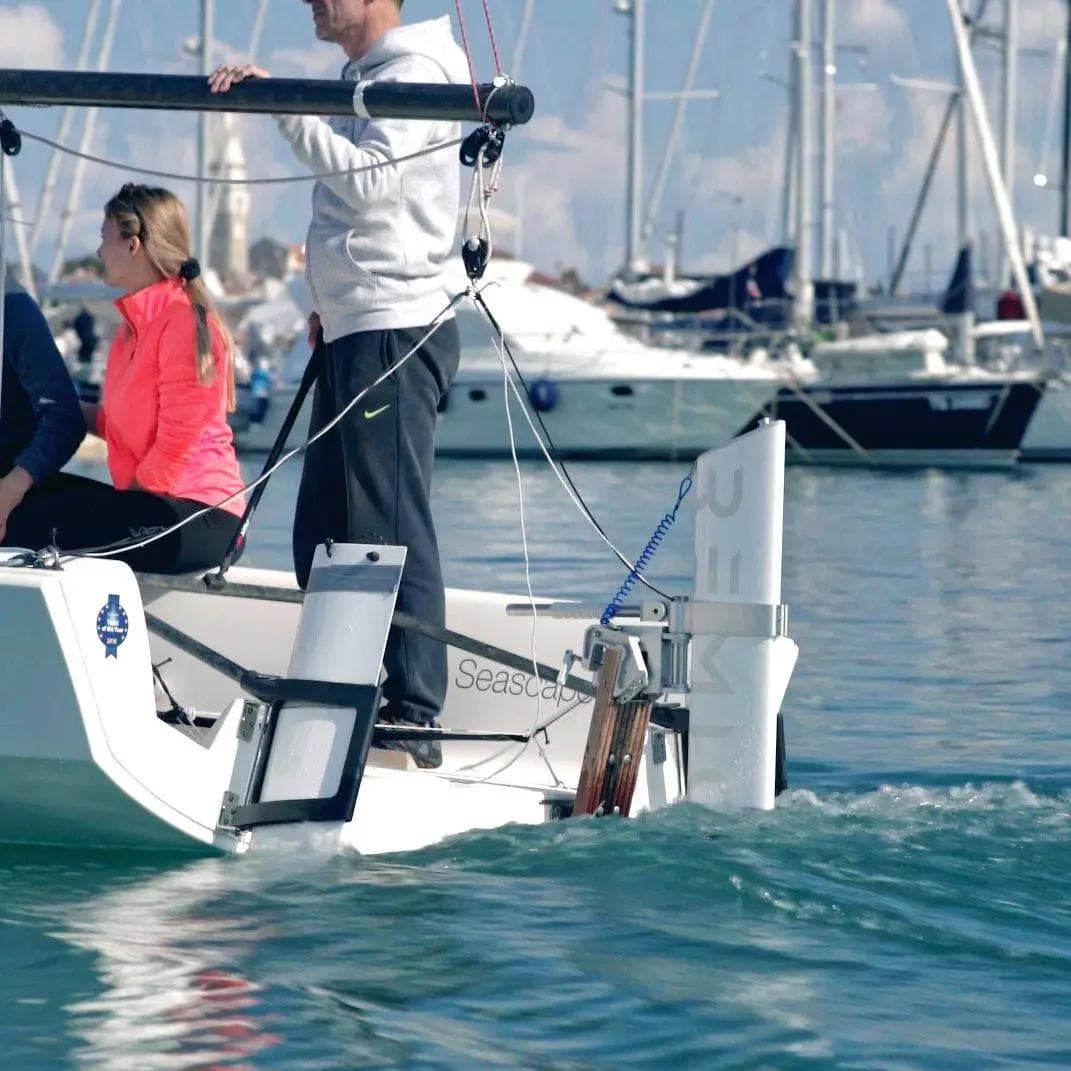
In terms of performance, Remigo is the most cost-effective option on our list. While all the motors there are relatively quiet, the Remigo One is among the most silent, even with its robust thrust.
Previously, I described the TEMO-1000 as having a "rudder-like design." However, things are slightly different this time.
This electric motor basically is… well… a rudder. (convince me otherwise)
It's a flat piece hinged vertically. There's nothing to prepare, assemble, or connect. You mount it on the tube, and off you go.

Weighing only 26lbs (12 kg) and designed compactly, you can easily carry the motor with one hand. The tiller handle doubles as a convenient carrying handle.
The latter doesn't have a traditional twist-grip throttle, instead featuring an intuitive two-button control module on the motor. This might require an operator to sit at the very stern, potentially disrupting the balance in the smaller dinghies.
The battery here is integrated, and despite being easy to handle and visually pleasing, it's the only motor in our top five that requires carrying the entire unit for charging.
- Battery capacity is average
- You can buy an additional AC Fast Charger from Remigo
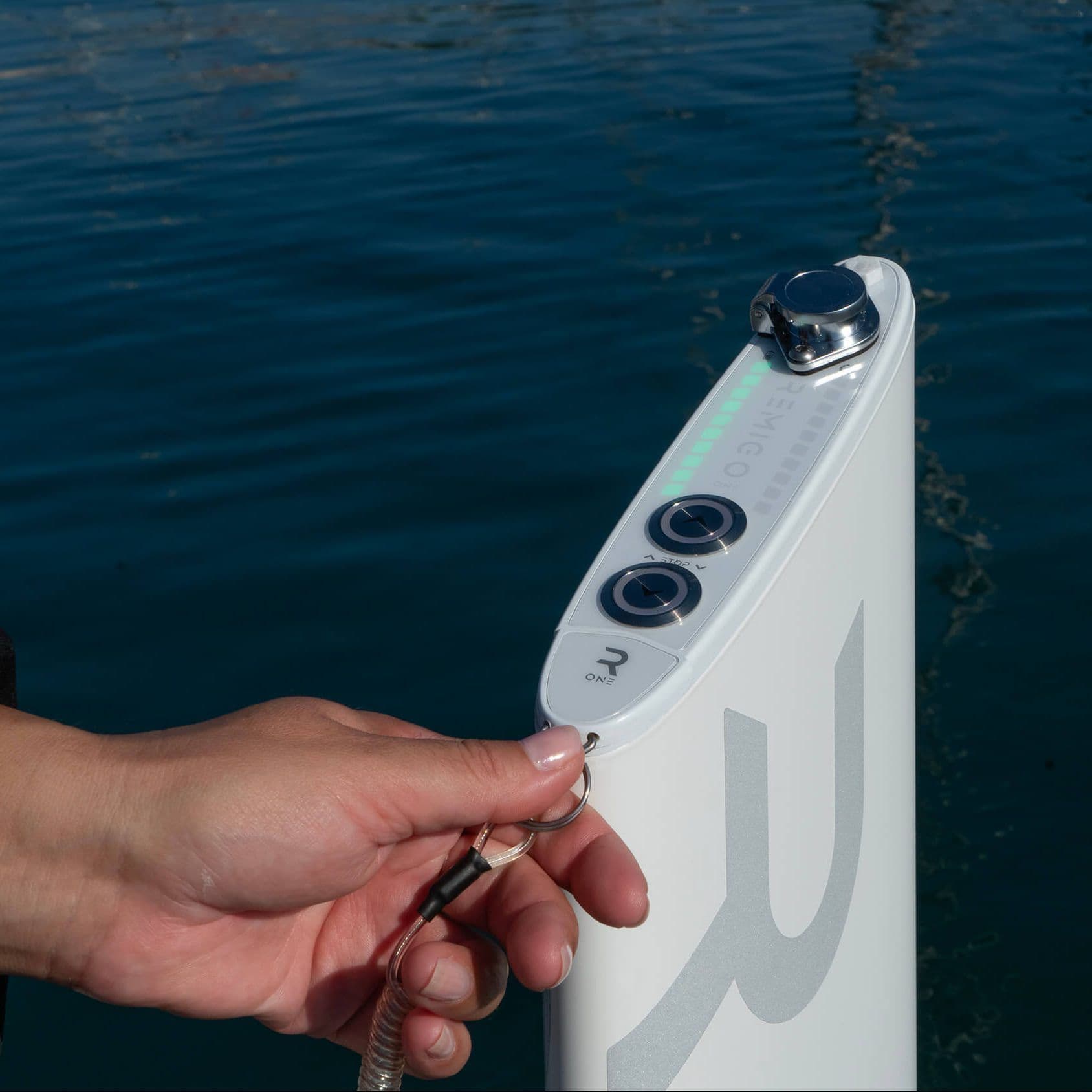
The motor lacks a digital screen, which the throttle and battery indicators don't fully compensate for.
Due to its single-unit design, Remigo One has an adjustable step-less shaft length, although adjustments require tools and can't be made on the fly.
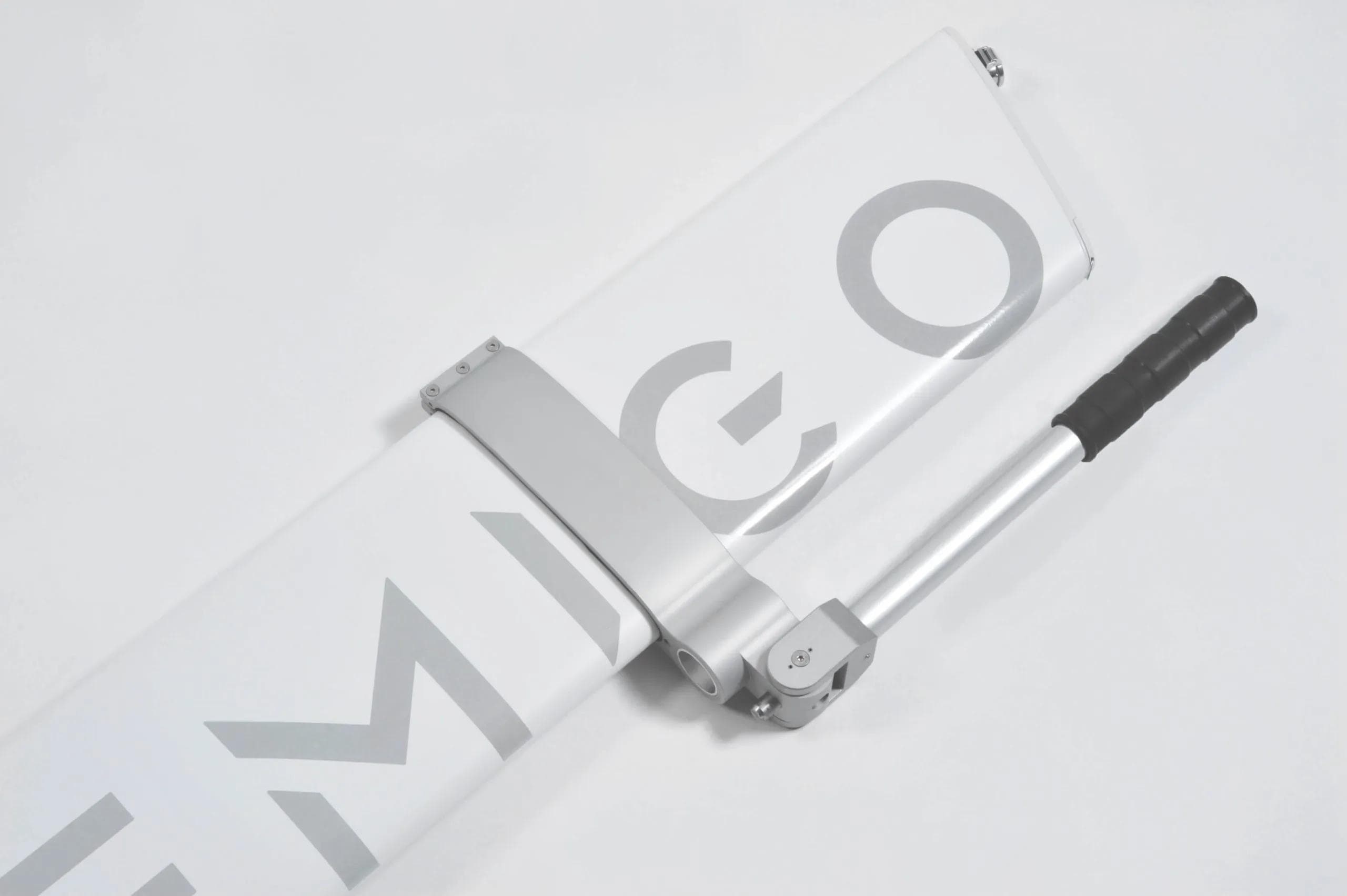
Also, I don't know where you are on the anxiety scale when leaving your dinghy unattended with the outboard attached, but given its overall portability and ease of mounting—and, importantly, unmounting, I would need to take this $2,400 jewel with me wherever I go.
So, why does it deserve to be in the top 5? And Does it deserve to be your motor of choice?
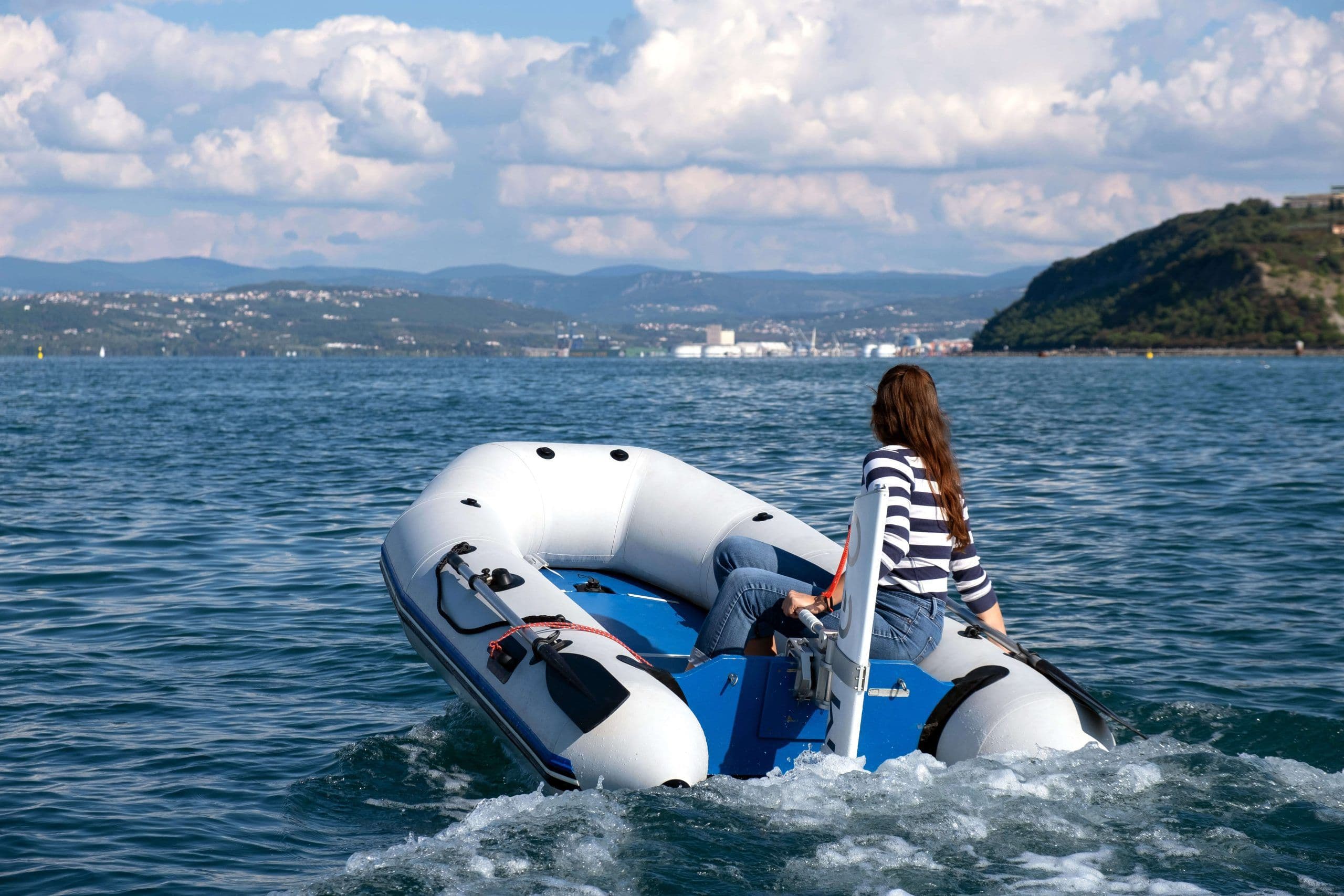
"Simplicity is the ultimate sophistication."
The Remigo One grabs the third spot for being brilliantly simple. This product has a "mount it and go" kind of approach.
It is lightweight, quiet, and offers an adequate amount of power for its price, which is incredibly reasonable. If you want something cost-effective and straightforward, the Remigo One is your guy.
Let's move on to the second place. I must admit, the competition is tough.
#2 Torqeedo Travel (Essential Package)
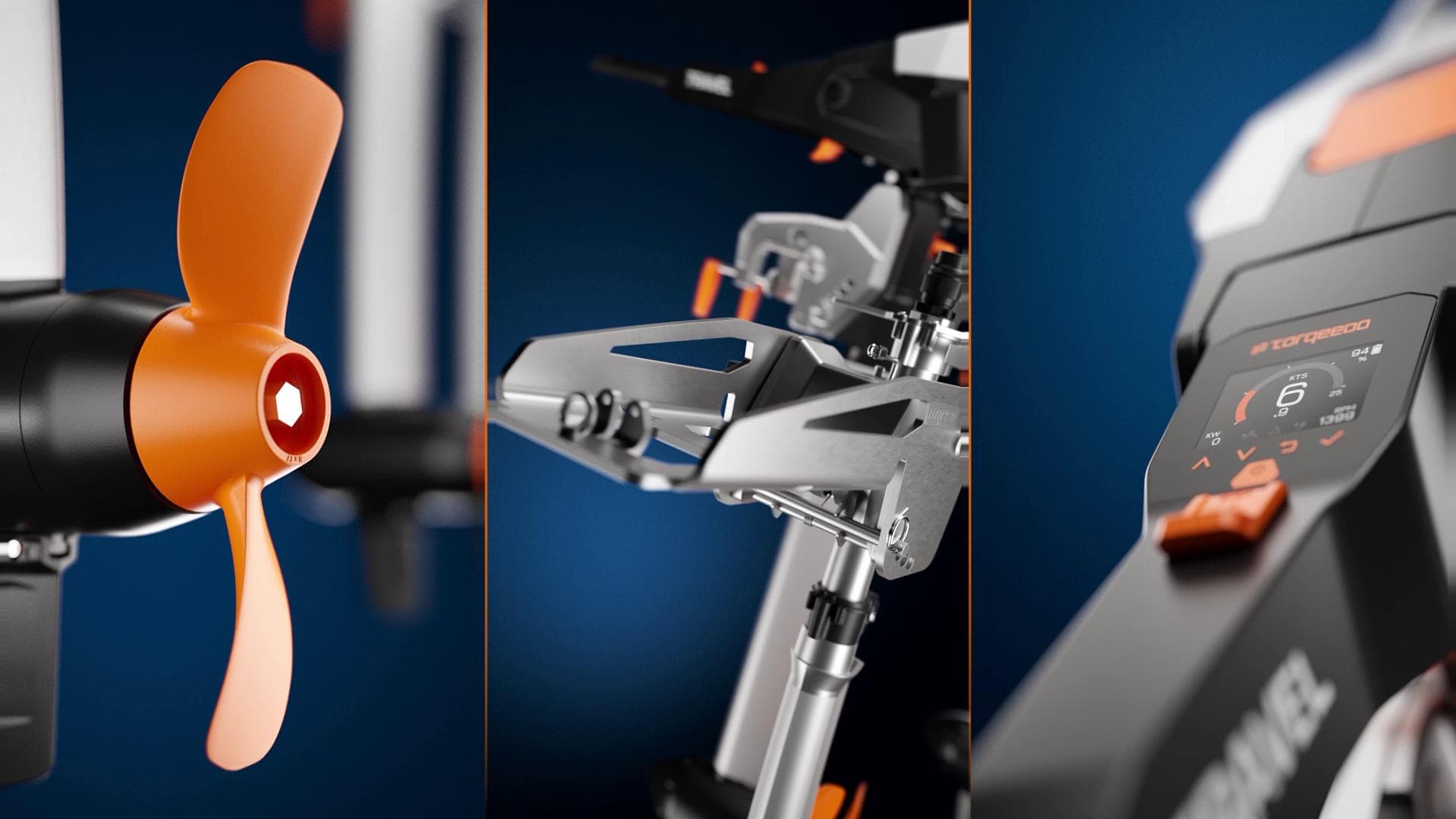
Okay, folks, y'all know Torqeedo products need no introduction. Recently bought by Yamaha, these guys continue to spearhead electric propulsion into the mainstream market.
After some debate and comparing the newly launched Torqeedo Travel with its older version, the Torqeedo Travel 1103 C, I decided that it's the new model should represent Torqeedo in this TOP 5. Why? Although older models still sell fast, the latest tech deserves the spotlight. There are a few things I will make more comments on later.
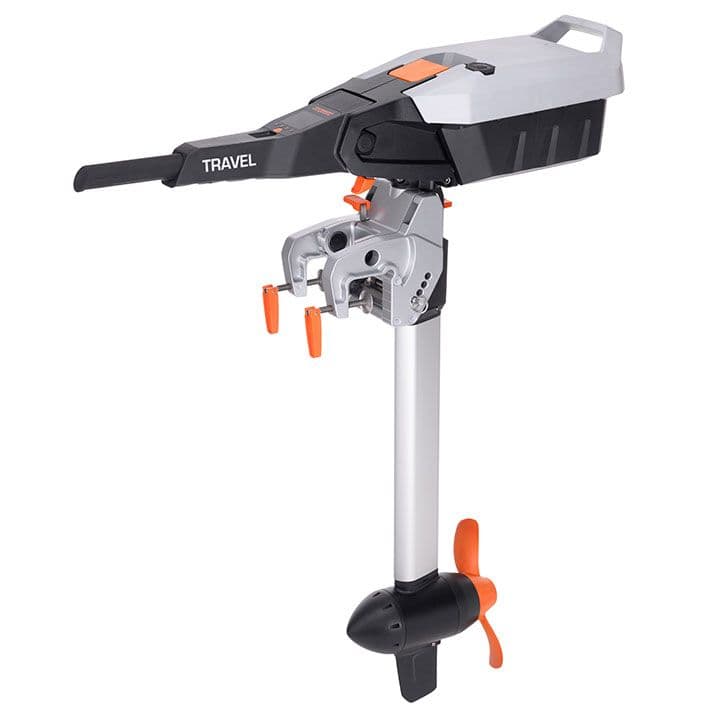
From the get-go, this motor stands out in our review as the most sophisticated: GPS, Bluetooth, WiFi — everything a tech enthusiast could dream of.
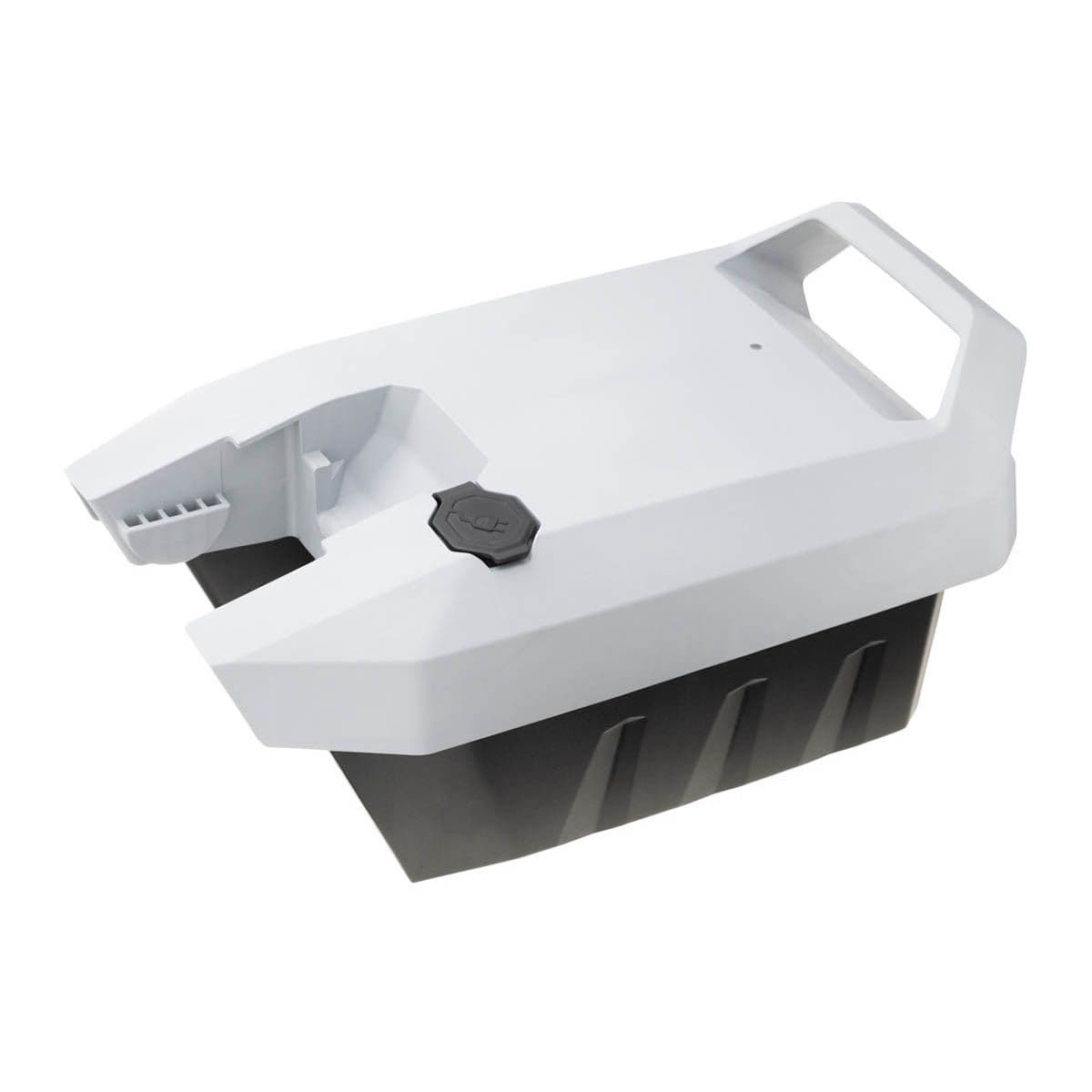
Handling the motor might not be the most straightforward task, but its modular design eases the pain. You can break it down and set it up piece by piece: shaft, tiller, battery.
The shaft's base offers 360-degree rotation for easy battery installation from within your dinghy. Though the shaft length isn't adjustable, you have two size options: 24.5 inches (62.5 cm) or 30 inches (75 cm).
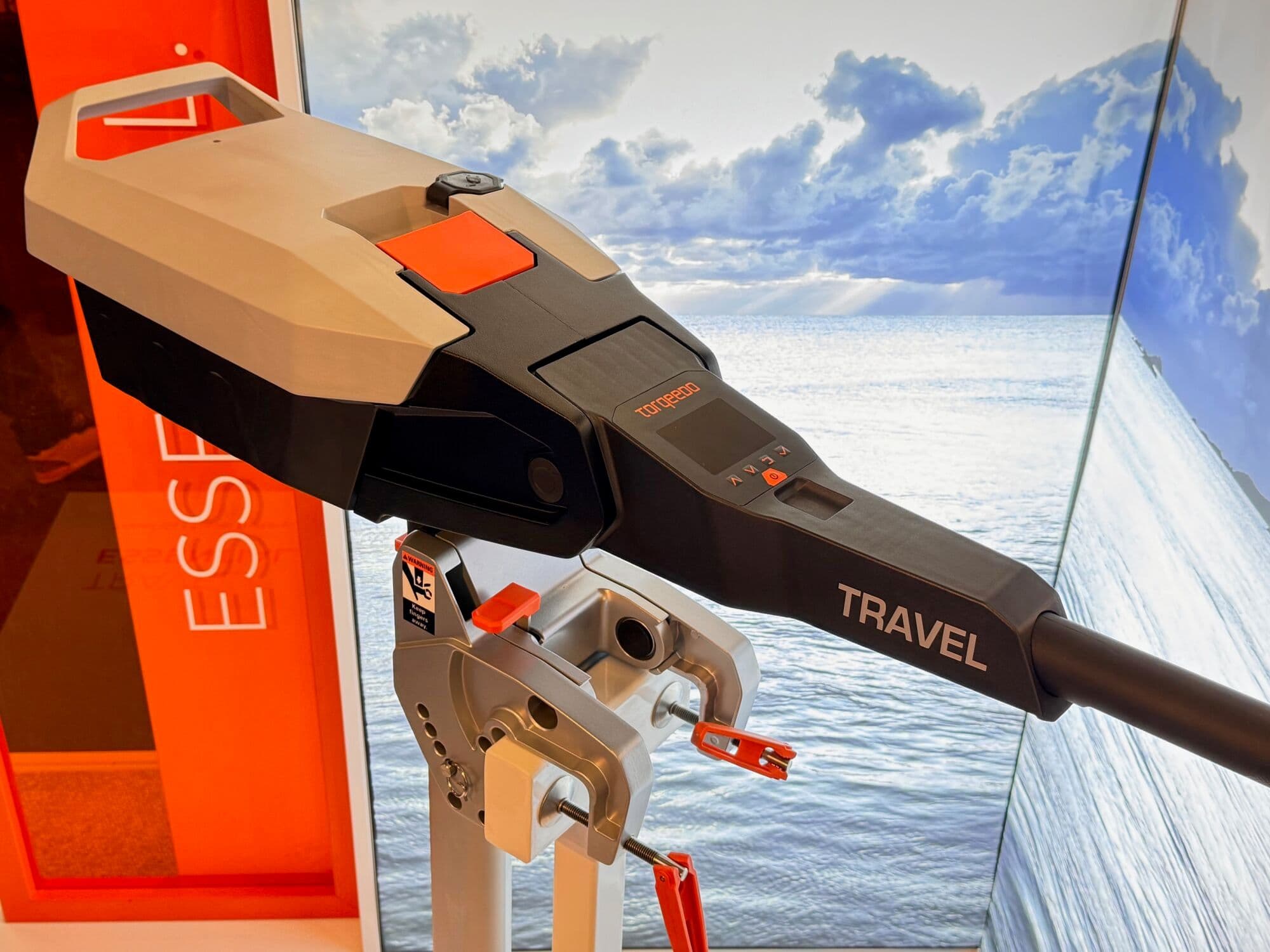
The tiller folds and adjusts and features a vibrant full-color display. Need a different tiller direction? Tweak it in the settings menu. Torqeedo also provides an option for a more extended tiller handle if needed.
Integration with the Torqeedo app allows you to connect the motor to your phone for convenient status checks, firmware updates, and usage statistics.
At this point, some might wonder, "Is this an Epropultion's Spirit killer?"
Yes… and no.
As you'll soon figure out, these two competed for first place. And given that Troqeedo Travel has the slightest edge in functionality—thanks to its recent update—some may find it curious why it ranks just behind.
But the thing is, Epropultion, in its latest "Evo" form, has been on the market for about three years and has been thoroughly vetted by users.
Plus, as of now, the newness of Torqeedo Travel brings some challenges in availability and pricing; it's not easy to find, and resellers might charge a premium of $500 over its sticker price and put you on a waitlist for the battery.
But don't worry—I'll keep this review updated. We might reshuffle our rankings after gathering user feedback in the summer of 2024.
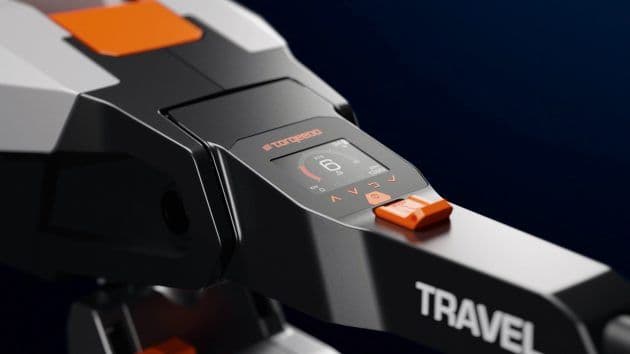
So, why does it deserve to be in the top 5? And Does it deserve to be your motor of choice?
Torqeedo Travel is the techiest, most feature-packed outboard you can strap to your boat. If you love the latest gadgets and don't mind waiting to get your hands on them, this should be your motor of choice. It's like owning the hottest new smartphone—everyone wants to check it out, making every trip a little more special.
Let's get straight to the point—there's no beating around the bush here.
#1 Epropulsion Spirit 1.0 Evo
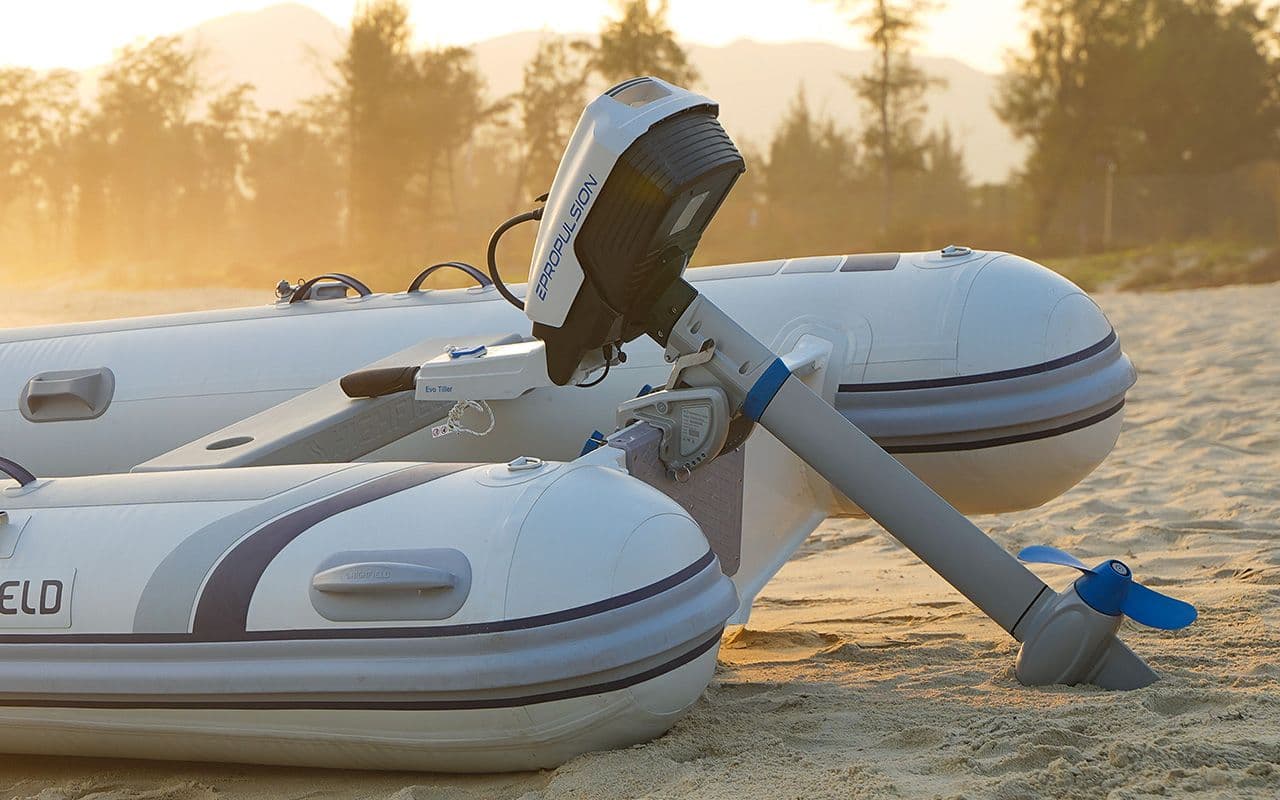
What's remarkable is that the first Spirit 1.0 hit the waters 10 years ago, and the model soared into 2024, staying on top with only a few tweaks here and there. The 2018 Spirit 1.0 Plus upgraded to a 48V architecture, making friends with third-party batteries, and by 2021, the world got its hands on the Spirit 1.0 Evo.
It's 2024, and Evo still offers one of the best performances for its price. It is the second cheapest outboard on our list and has the best performance score.
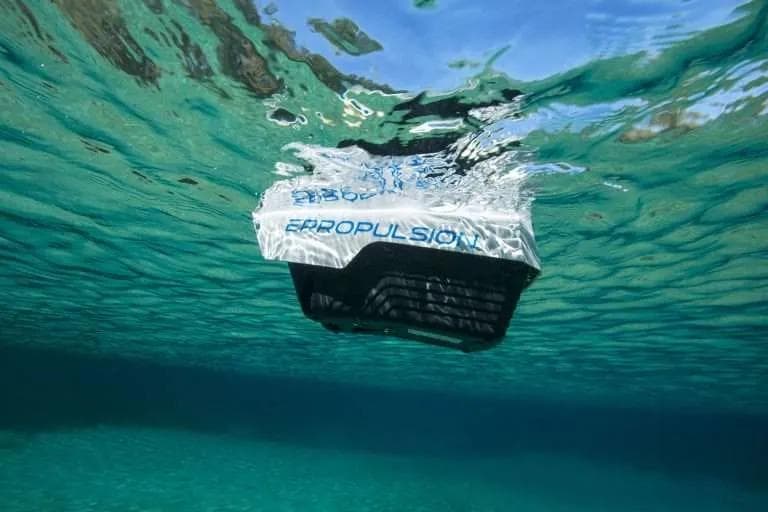
And from the battery, we start.
Let's be honest. The Spirit's batteries have floated in water since 2014, so there's nothing new under the sun. But if you were given one, what would you do with it first?
Okay, perhaps not immediately, but you understand my point.
It's interchangeable, so you can tote a spare. It's just slides into place…
- ... and you good to go?
No, not this time. It requires a wired connection to the motor. After seeing so many plug-and-play systems, this might feel like a step back.
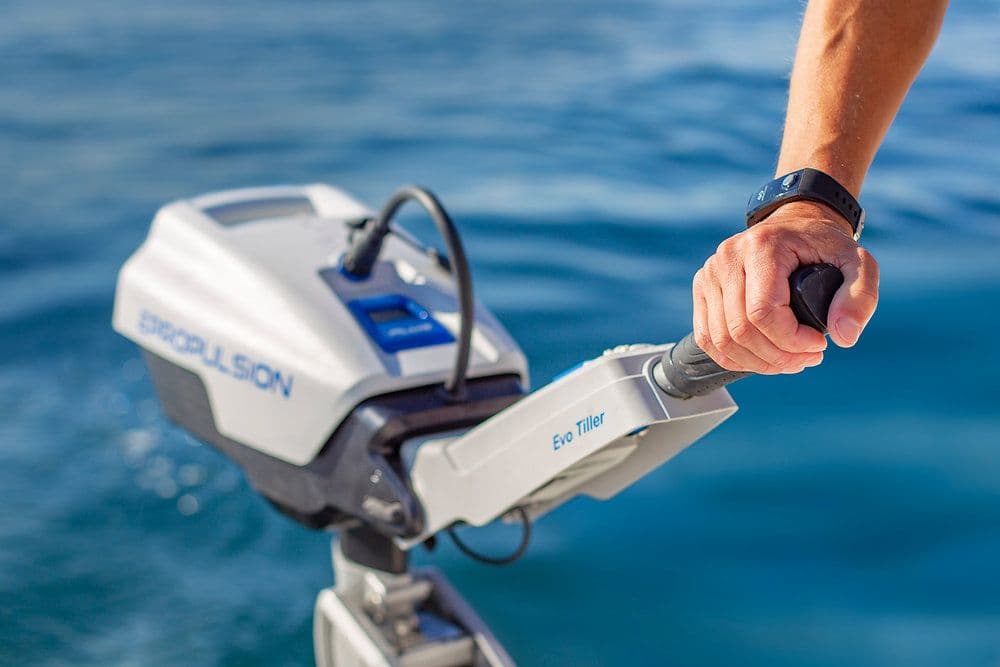
But hey, remember that 48-volt setup from 2018? These systems are gaining traction, and thanks to those wired connectors, hooking up a third-party battery that meets your needs will be a piece of cake.
Also, the Epropultion battery has dual power ports, which allow you to charge it with your foldable solar panels while discharging (read: being on the go).
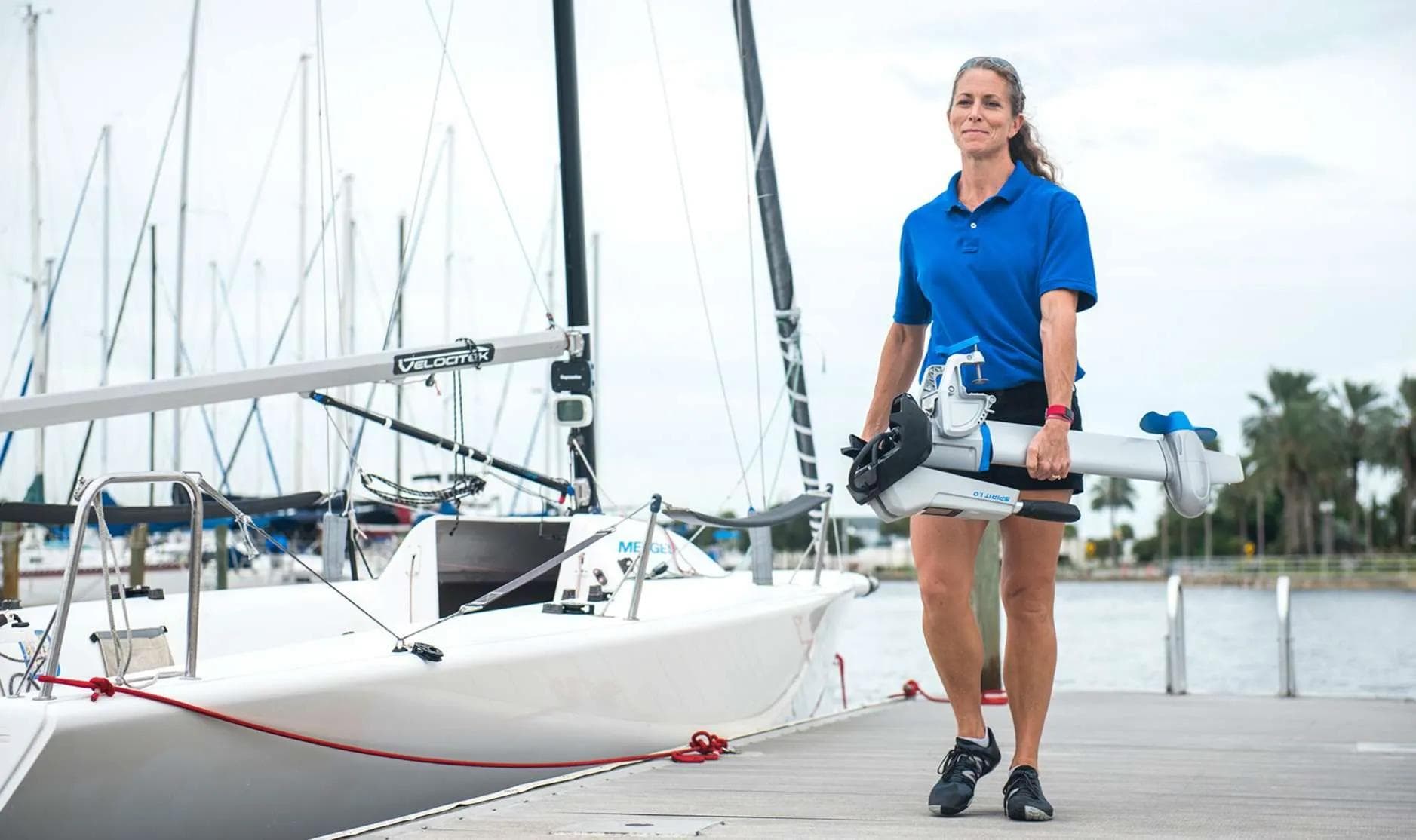
It's not precisely featherlight, though, weighing about 20lbs (9kg). The fully assembled motor tips the scales at around 45 lbs (20kg). It's not the easiest to lug around, but like the Torqeedo Travel, it comes apart and goes back together almost effortlessly. A 360-degree rotation feature makes it easy to insert the heaviest part—the battery—from inside the boat.
The motor has a special tilting mechanism for shallow-water adventures that protects the propeller in case of underwater surprises.
The tiller is adjustable and comes with a backlit digital display, albeit slightly behind the curve compared to Mercury's Avator and Torqeedo's Travel.
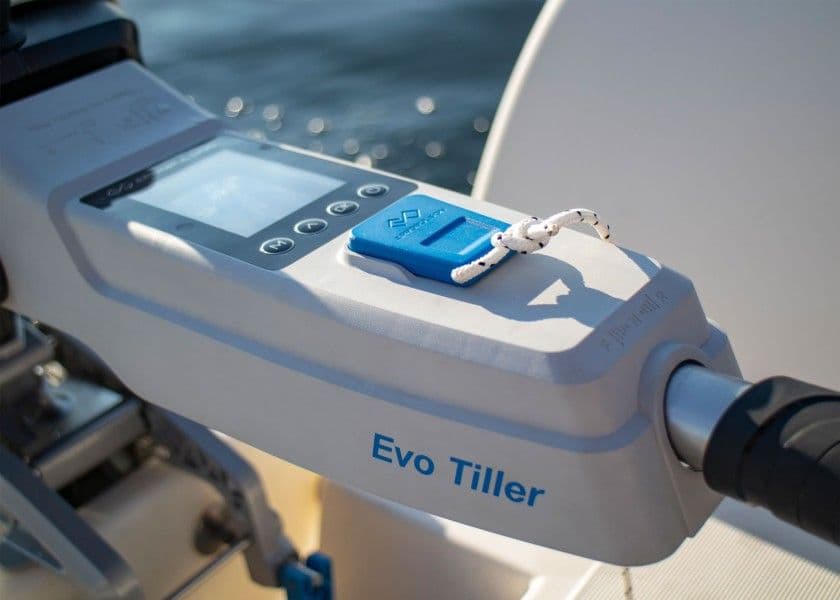
Also, despite being a motor of excellent quality, tested by time at rigid seas, the tiller is prone to cracking, particularly at its base. I bet people are trying to raise the locked shaft from the water by brut-forcing poor tiller.
Oh, and I forgot to mention, in my opinion, the Spirit 1.0 Evo isn't just "remarkably quiet"—it's the quietest of them all.
But let's talk about securing that battery during shore-side jaunts.
No matter how hard you try to keep it in place, it might not be enough, given that it can be disconnected and lifted in just a second. And these batteries are costly, you know.
If you're the type to get easily worried, you might end up pacing the docks with a 20-pound kettlebell in your hand.
It's fair to say that it applies not only to Epropultion. It's just that Epropulsion happens to have the heaviest "kettlebell."
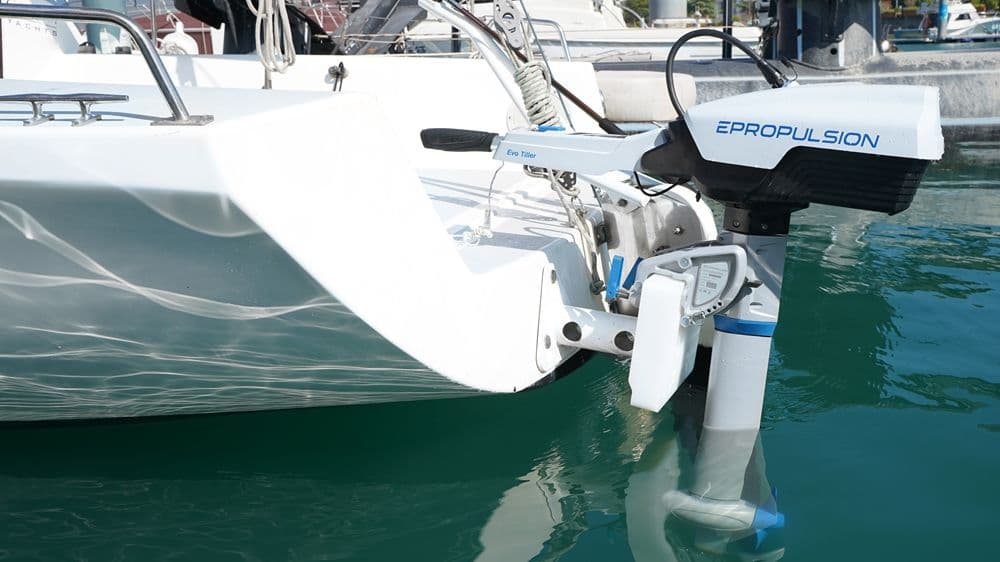
nd the last thing (or two), which hits home for me as a sailboat enthusiast:
When used on a sailboat, under sails, the prop generates electricity and stores power in the battery. Hydrogeneration kicks in at 4 knots, generating 40W of power. At 10 knots, you'll get about 330W (the safety limit), and if my math is correct, it will fully recharge your battery in just over three and a half hours.
Also, the wireless killswitch wristbands are a real boon for sailboat use.
So, why does it deserve to be in the top 5? And Does it deserve to be your motor of choice?
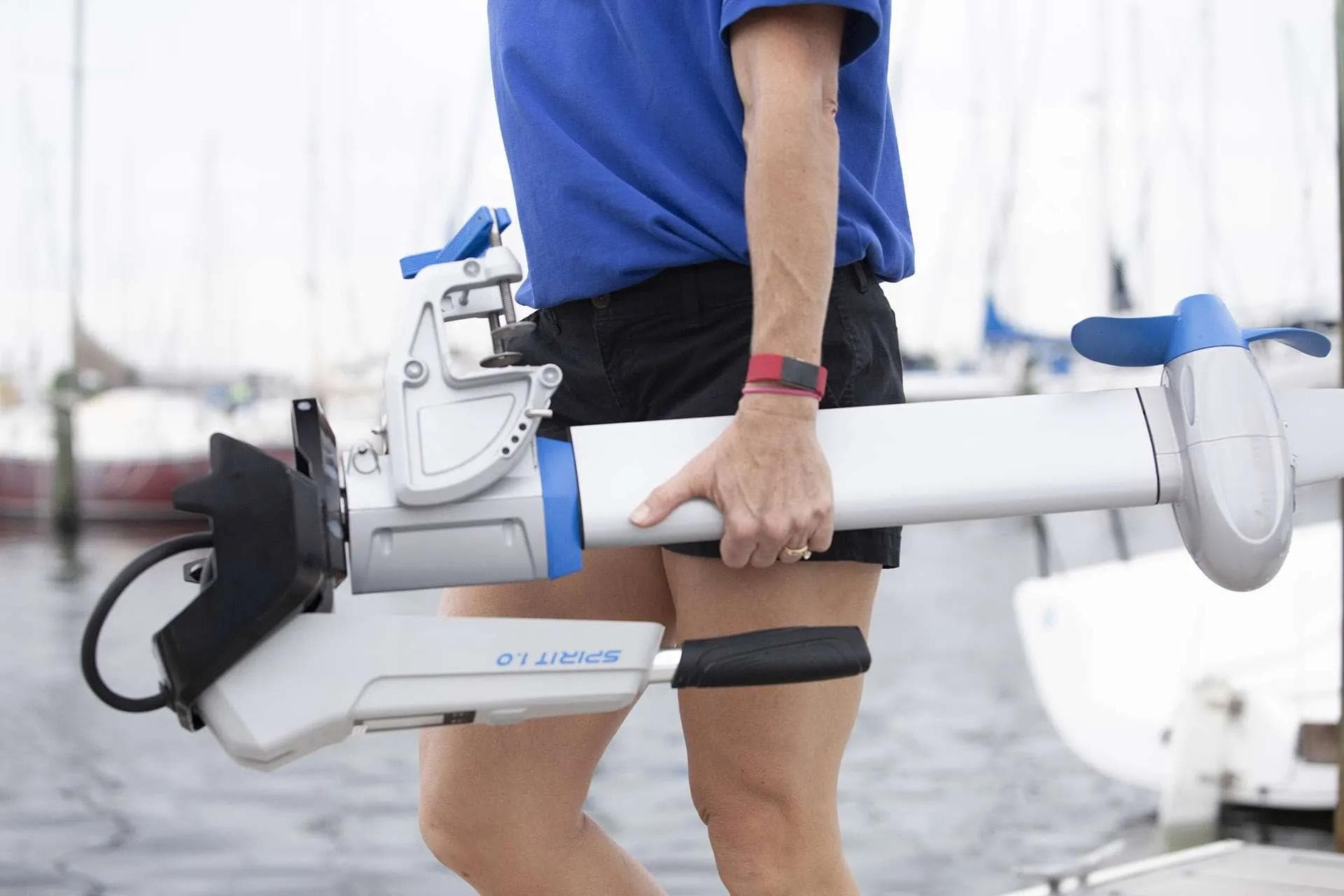
Epropulsion Spirit 1.0 Evo earns its place in the top 5 as a reliable electric boat motor. It's not the newest kid on the block, but it stands out for its solid track record and incremental updates that keep it competitive. If you appreciate a motor that's proven its worth year after year and keeps delivering solid performance, then the Spirit 1.0 Evo is a smart pick.
So, there you have it: the top 5 electric outboards on the market today.
Each one brings its own unique charm to the table, from the practicality of the TEMO-1000 to the luxury of the Mercury Avator 7.5e, the simplicity of Remigo One, the tech-savviness of Torqeedo Travel and reliable performance with Epropulsion Spirit 1.0 Evo.
Choosing an e-outboard is not just about horsepower or battery life; it's a personal decision that should align with your boating style, values, and needs. Each motor in our list has strengths that make it uniquely suitable for specific use cases.
Most importantly, choosing an e-outboard means taking a step towards a more sustainable future for boating—helping us to continue enjoying our waters while protecting them at the same time.
And remember: whether you're a weekend cruiser, avid fisherman, high-tech sailor, or tranquility seeker, there's an electric motor out there that can transform your experiences on the water. We hope this review guide helps you find that perfect fit!
Go ahead, plug into change, and ride those silent waves with confidence – because in e-boating, we trust!
- Power and Performance
- Ease of Use
- Quiet Operation
- Environmental Impact
- Innovative Features


